Sport Management News
Campus Takeover
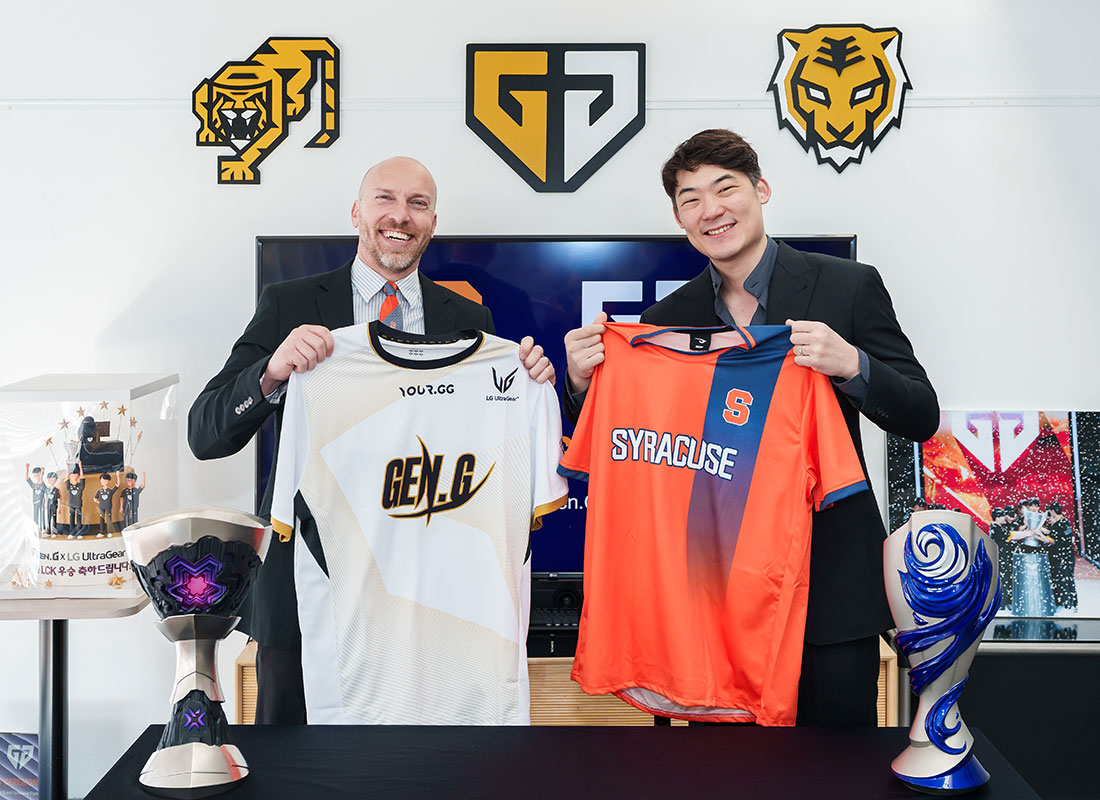
Syracuse University and global esports and gaming organization Gen.G have opened general registration at campustakeover.gg for its first Campus Takeover Sept. 20-21. The two-day conference will bring students and administrators to Syracuse to highlight career opportunities within the esports industry and various ways in which students can use esports for project-based learning within the careers of their choice.
Campus Takeover will offer diverse programming headlined by the first-ever national Esports Business Case Study Competition for undergraduate students interested in esports, traditional sports, and gaming. The event will also feature daily keynote presentations, industry panels for collegiate esports professionals, career panels for students interested in working for the esports industry, and daily networking events. Campus Takeover will feed into Syracuse University’s Career Week from Sept. 22-26 hosted by Syracuse University’s Career Services.
“When we announced our multiyear partnership with Syracuse in December, we committed to enhancing student engagement opportunities,” says Gen.G CEO Arnold Hur. “Campus Takeover will provide that opportunity for anyone interested in esports and gaming to learn more about our industry and build an impactful career.”
“We’re absolutely thrilled to bring Gen.G’s award-winning Campus Takeover event to Syracuse University,” says Syracuse University Executive Director of Esports Joey Gawrysiak. “This partnership represents more than just a high-profile esports event—it’s an opportunity for students, faculty, and staff across disciplines and institutions to come together.
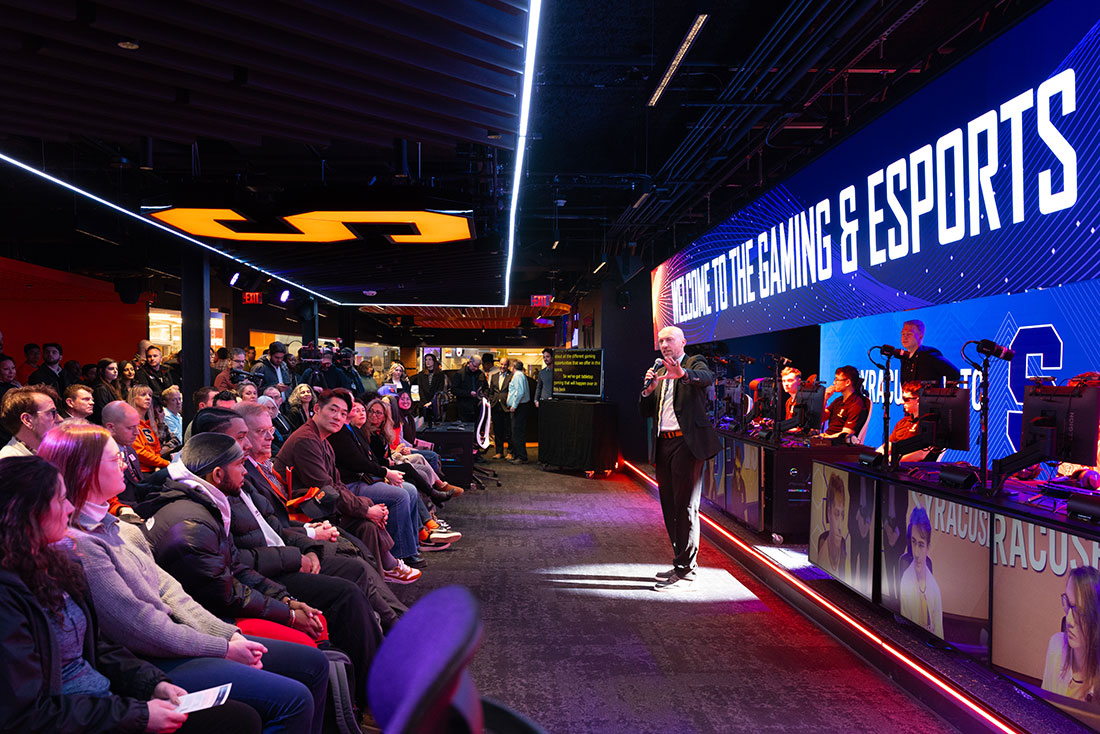
“Campus Takeover will showcase what makes esports such a powerful connector in education,” Gawrysiak adds. We can’t wait to have everyone on our campus as we offer dynamic programming that focuses on professional development, competition and collaboration.”
Gen.G and Syracuse have also partnered on the Gen.G Practicum Abroad, which offers students the opportunity to take part in an intensive, three-week program to study in South Korea. This programming complements the innovative Esports Communications and Management bachelor’s degree at Syracuse University offered jointly by the Falk College of Sport and Newhouse School of Public Communications.
About Gen.G
United under #TigerNation, Gen.G’s core mission is to help fans and athletes use the power of gaming and esports to get ahead of and beyond the competition. Gen.G is a commercial and thought leader, building a global, inclusive and cross-cultural future for gaming, while competing professionally across League of Legends Champions Korea (LCK), VALORANT, Rocket League, and PUBG. Gen.G also operates the Gen.G Global Academy, the world’s first fully-integrated academic esports program in Korea. Gen.G’s teams, content creators and corporate staff work out of their offices in Los Angeles, Seoul and Shanghai. For more information, visit GenG.gg or follow on Twitter/X @GenG.
About Syracuse University’s Esports Communications and Management Program
Syracuse University’s first-of-its-kind Esports Communications and Management B.S. program is offered jointly by the S.I. Newhouse School of Public Communications and the Falk College of Sport, which on July 1, 2025, will launch as the first college on a high-research activity campus to focus on sport-related disciplines. The program includes three tracks: Esports Business and Management, Esports Communications, and Esports Media and Design. It prepares students for an exciting career in esports and related industries through classes in event management and marketing, broadcasting/production, communications, content creation, entrepreneurship, strategic communications, and esports experience and design.
Excellence in Education

The Falk College of Sport and Human Dynamics is proud to share that the following seven faculty members received promotions and/or were granted tenure:
Jason DeFreitas, Exercise Science
Awarded Tenure
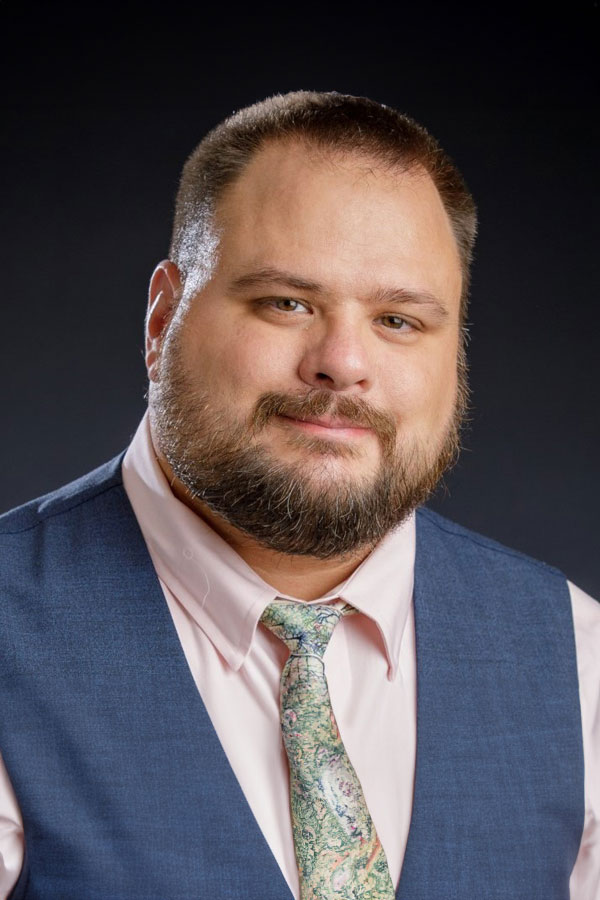
Jason DeFreitas, Ph.D., joined Falk College in the Department of Exercise Science as a professor and department chair in 2024. He earned his Ph.D. and master’s degree from the University of Oklahoma, where he later became a faculty member, spending 11 years teaching classes primarily focused on neuroanatomy and neuromuscular physiology.
His research focuses on how the brain controls movement and how aging and training change that control system. While at Oklahoma State, he won several university-wide awards for his research.
DeFreitas was among the second cohort of the Hevolution/AFAR New Investigator Awards in Aging Biology and Geroscience Research, a grant program that enables early career investigators with labs in the United States and Canada to advance research projects in basic biology of aging and geroscience projects that pave the way for healthspan-expanding therapeutics and treatments.
“Dr. DeFreitas has established himself as a highly productive scholar in neuromuscular physiology and exercise neuroscience,” says Falk College Dean Jeremy Jordan. “His publication record demonstrates both quantity and quality, with 91 peer-reviewed articles that have garnered over 2,500 citations. Of his total publications, he has maintained first or senior author position on 54 percent of papers, demonstrating his leadership role in research collaborations.”
Ignatius Ijere, Public Health
Promoted to Teaching Professor
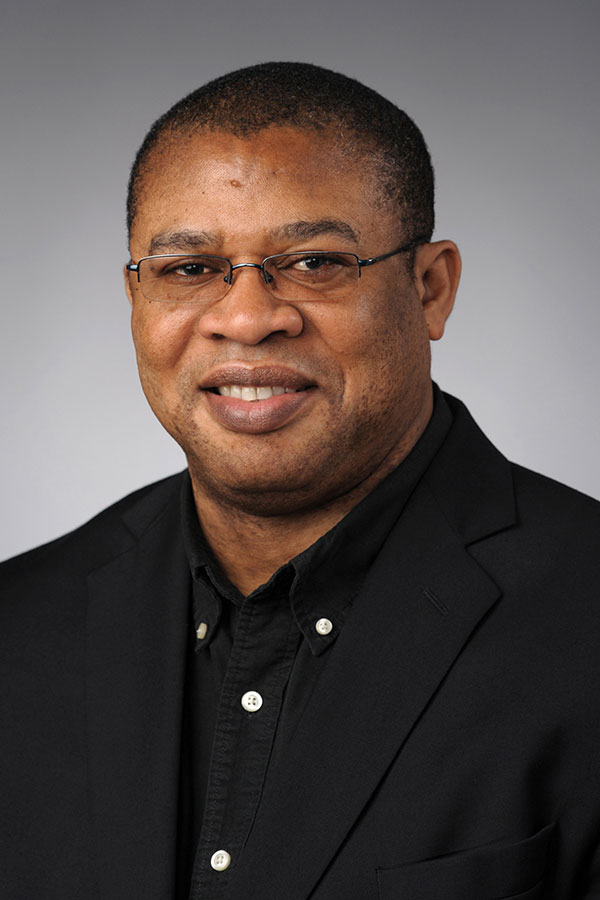
His expertise is in the areas of mental illness and addiction with professional experience as a mental health and addiction counselor with the Gateway Foundation and Thresholds Psychiatric Rehabilitation Centers. He previously served as an adjunct faculty member in the Department of Public Health at the College of DuPage, Waubonsee Community College, and St. Augustine Community College.
“Peer and student evaluations of Dr. Ijere’s teaching performance are consistently positive and describe a deeply respectful professor who cares about student well-being,” Department of Public Health Chair David Larsen says. “They also a describe an approach to teaching which is skillful, particularly when it comes to organizing complex and/or difficult material in ways that students can understand. Dr Ijere has taught an incredibly diverse menu of courses, and I laud his willingness to step in and teach courses on overload that are critical to department success.”
Jeremy Losak, Sport Analytics
Promoted to Associate Professor with Tenure
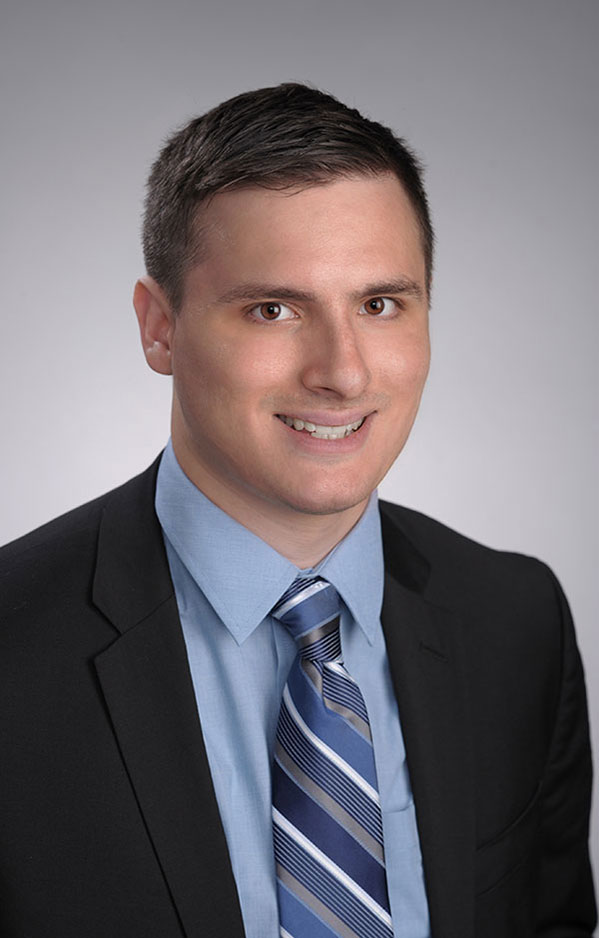
He is one of the faculty members who organizes and runs the Berlin Sports Analytics Academy, a program that brings high school students from across the country to Syracuse University over the summer to provide them with an immersive, hands-on college preview.
“Jeremy is an outstanding teacher and mentor, known for his dedication to student success both inside and outside the classroom,” says Sport Management Professor Rodney Paul, Ph.D., director of the Sport Analytics program. “His engaging teaching style and accessibility have made a lasting impact on the Sport Analytics program.
“Jeremy’s research spans sport economics, sports betting, and fantasy sports, with work published in leading journals such as the Journal of Sport Economics and the International Journal of Sport Finance,” Paul adds. “This is a well-earned recognition of his contributions across teaching, mentoring, and scholarship. Congratulations, Jeremy!”
Miriam Mutambudzi, Public Health
Promoted to Associate Professor with Tenure
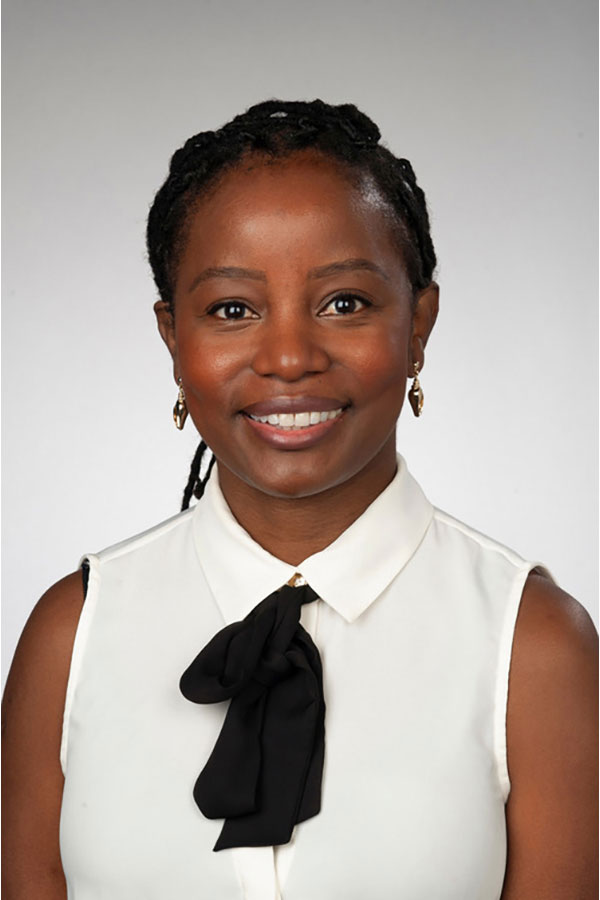
Prior to joining Syracuse University, Mutambudzi served as a research associate in the MRC/CSO Social and Public Health Sciences Unit at the University of Glasgow in Scotland, and a guest epidemiology professor in the Department of Epidemiology and Social Medicine at the University of Antwerp in Belgium. She has published extensively in peer-reviewed journals, including the European Journal of Ageing, Journal of Gerontology: Medical Science, and the Journal of Occupational and Environmental Medicine.
“Dr. Mutambudzi has established herself as a leading scholar in life-course epidemiology, with expertise in examining how socially patterned exposures and cumulative biological burden influence disease risk and health outcomes in older adults,” says Falk College Dean Jeremy Jordan. “Her research portfolio demonstrates both impressive productivity and significant impact on the field.”
Lisa Olson-Gugerty, Public Health
Promoted to Teaching Professor
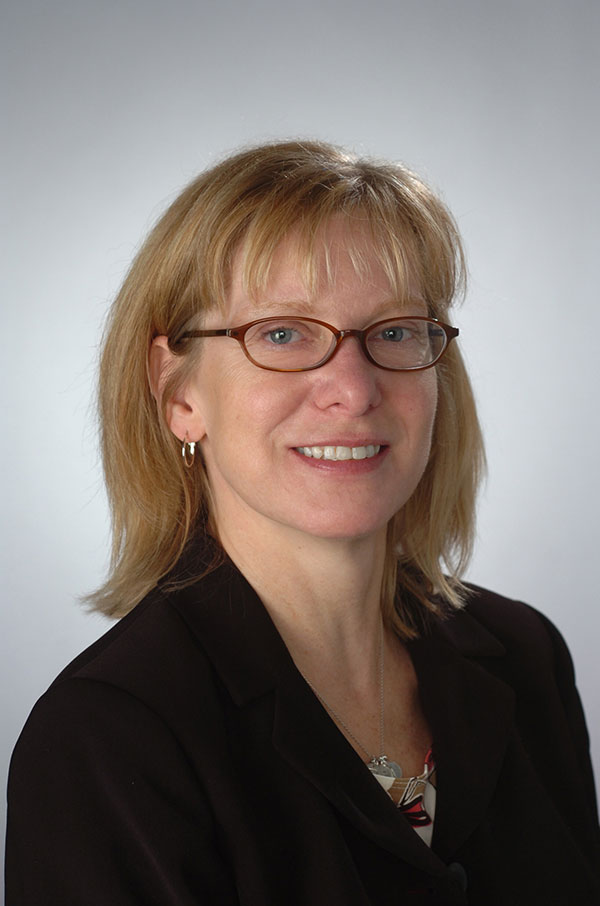
Olson-Gugerty is a nurse practitioner who maintains an outside practice as an emergency healthcare provider at a regional community healthcare center. She earned her Doctor of Health Science (D.HSc.) from Nova Southeastern University, and she also holds a Master of Public Health from the University of South Florida, a master’s degree in Nursing, Family Primary Care, from SUNY Upstate Medical University, and a bachelor’s degree in health science from SUNY Cortland.
Olson-Gugerty has served as a faculty thought leader by granting interviews to several top media outlets, including most recently ABC News, Yahoo Life, and Parade.
“Professor Olson-Gugerty has a background as both a practicing clinician and an academic,” says Department of Public Health Chair David Larsen. “This has informed her teaching philosophy, which emphasizes real word applications and the development of student critical thinking skills. She is dedicated to the student experience and works to create an inclusive and welcoming classroom environment.”
Stefanie Pilkay, Social Work
Promoted to Associate Professor with Tenure
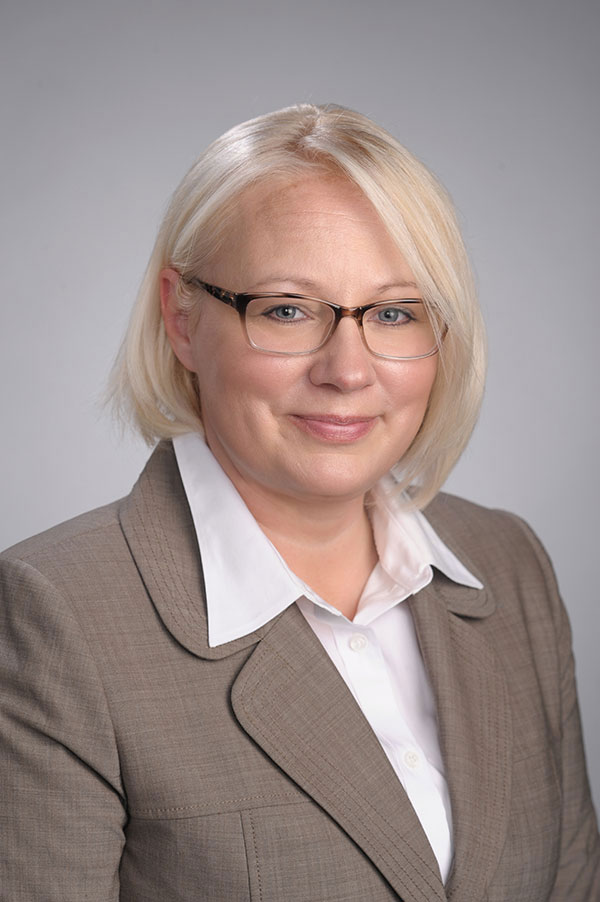
Pilkay’s scholarship addresses longstanding needs to better understand the relationships between adversity, epigenetic changes, and developmental outcomes including health and behavior to improve treatment and prevention outcomes for children and adolescents with health and behavioral issues exposed to poverty, stress, and environmental toxicants. Dr. Pilkay’s pioneering studies have been published in peer-reviewed journals, and her work has been supported by external grants. She has investigated particularly important questions of relevance to social work and genetics, especially in her pioneering work on trauma and its impact on gene expression.
“Dr. Pilkay is an exceptional addition to our faculty, and we are thrilled to welcome our newest colleague to our ranks!” says School of Social Work Chair Carrie Jefferson Smith.
Xiafei Wang, Social Work
Promoted to Associate Professor with Tenure
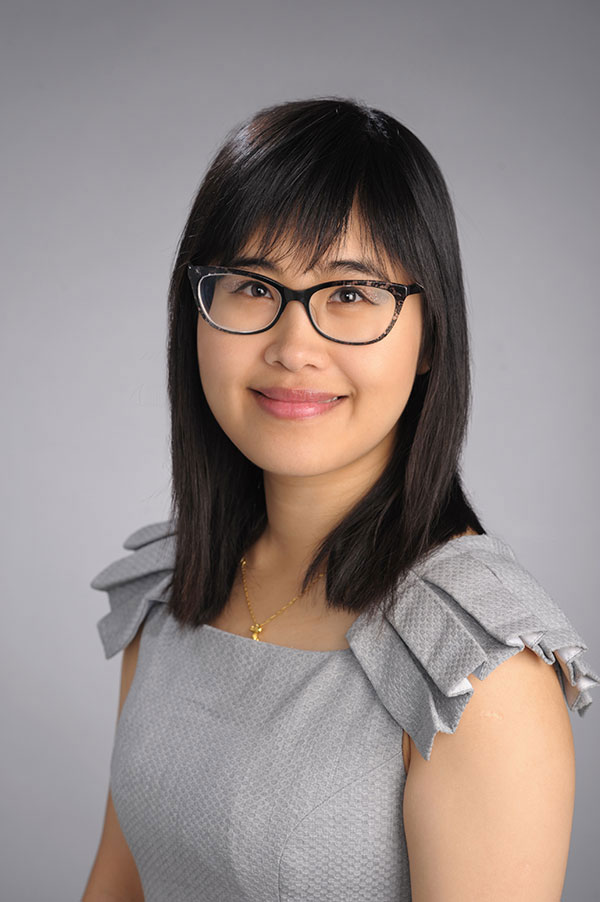
Wang’s scholarship addresses childhood trauma, intergenerational transmission of trauma, resilience, and the roles of race, gender, rural culture, and military experiences. Her work provides direct implications for designing programs and policies for diverse people experiencing trauma.
Awarded the Falk College Faculty of the Year Award for Excellence in Research in 2021, Wang has published extensively in high-impact journals and in chapters of peer-reviewed books. She has established a robust record of external funding from notable sources, including the Health Resources Services Administration and National Institute of Health.
“Dr. Wang has contributed substantially to the teaching and service environments of our program,” School of Social Work Chair Carrie Jefferson Smith says. “We are delighted to welcome Dr. Wang as a fully tenured colleague, and we anticipate a bright future as she continues to influence future directions in our understanding of trauma.”
As part of Syracuse University’s go-forward plan announced this past fall for the Falk College human dynamics programs, the Department of Public Health will join the Maxwell School of Citizenship and Public Affairs and the School of Social Work will be housed in the School of Education starting July 1, 2025.
Experiencing the ATL
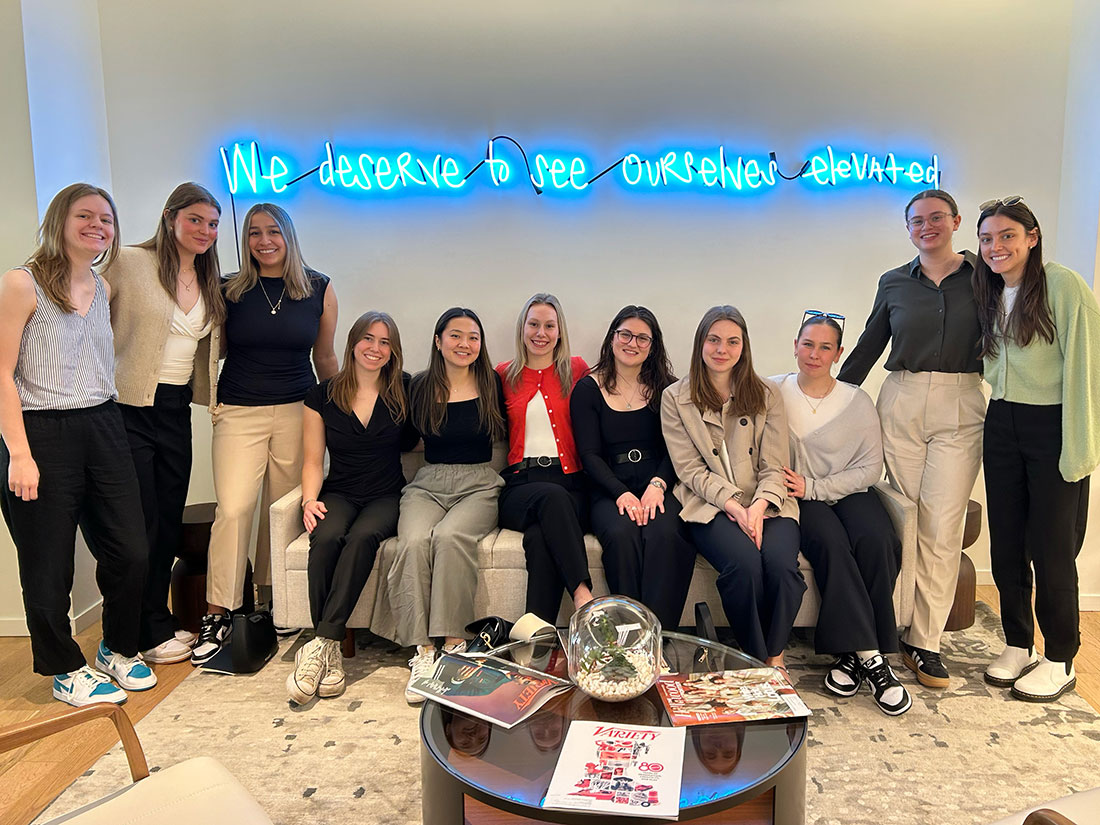
In addition, Atlanta has hosted the biggest events in sports, including the Summer Olympics in 1996, four Super Bowls, and the NCAA Final Four women’s and men’s basketball championships, and it will be one of 11 U.S. host cities for the 2026 FIFA World Cup.
Over the course of three jam-packed days in March, 11 female students from Syracuse University’s Falk College visited Atlanta to meet with numerous sports organizations and female executives from several sectors of the sport industry. The group also attended a Braves game at Truist Park.
Jake and Suzanne Doft have sponsored the trip for the past four years in honor of their daughter, Class of 2022 Sport Management graduate Dara Doft.
The students on the trip included Jordan Boron ’25, Kate Bradley ’26, Emily Gilbert ’27, Maggie Grejda ’27, Aryssa Hopps ’25, Janet Ji ’26, Lexi Katz ’27, Anna McDonald ’26, Claire Patin ’26, Brooke Siket ’25, and Tess Wright ’27. The students, all members of the Women in Sports and Events (WISE) Club from the Department of Sport Management, were accompanied by Falk College Director of Development Skylar Sabbag, Sport Analytics Program Manager Jackie Dorchester and former Internship Placement Coordinator Beth Perez, who’s now working for Syracuse University as an Assistant Director of Development, Leadership Annual Giving and Discovery.
We asked Siket and Bradley ’26 to share their favorite experiences from the Atlanta immersion trip, and here’s what they wrote:
Brooke Siket
(sport management major, marketing minor)
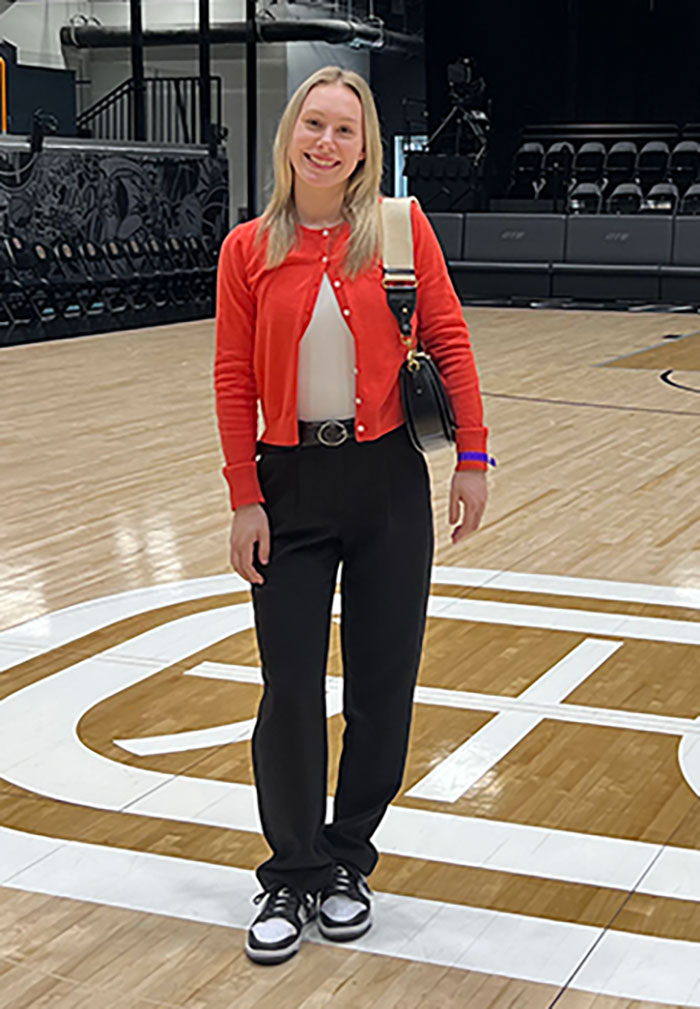
“As someone passionate about working in live sports and event management, this trip was everything I hoped for and more.
“Over three packed days, we met with representatives from the Atlanta Dream, Hawks, Falcons, United, Braves, Overtime Elite, United Talent Agency (UTA) and KLUTCH Sports Group, FanDuel, and the Atlanta Sports Council. Each organization gave us a behind-the-scenes look into their operations, shared advice about breaking into the industry, and emphasized the importance of relationship-building. Hearing from so many strong women in leadership roles made the experience even more empowering.
“One moment that stood out to me was our visits to UTA and KLUTCH Sports. While few of us initially had a strong interest in the agency side of sports, the insight they offered into athlete representation, contract negotiation, and brand building was an incredible and eye-opening experience.
“The WISE community created an environment where I felt encouraged to ask questions, connect with professionals, and see firsthand what a career in this industry could look like. This trip reminded me why I chose Syracuse and Falk; it’s the real-world opportunities and constant support that have helped me grow and feel prepared for a career in sports. This trip solidified my goals and expanded my network, and I’m so thankful to WISE, Syracuse University, the Doft family, and everyone we met in Atlanta for making it possible.”
During her time at Syracuse, Brooke Siket was a Syracuse University Athletics Facilities and Game Management intern, a Falk College Peer Advisor and Ambassador, a Sport Management Club member who worked on the annual Charity Sports Auction, and a WISE Club member. She’s currently working as a stadium operations intern for the Savannah Bananas baseball team.
Kate Bradley
(sport management major, emerging sport enterprises minor)
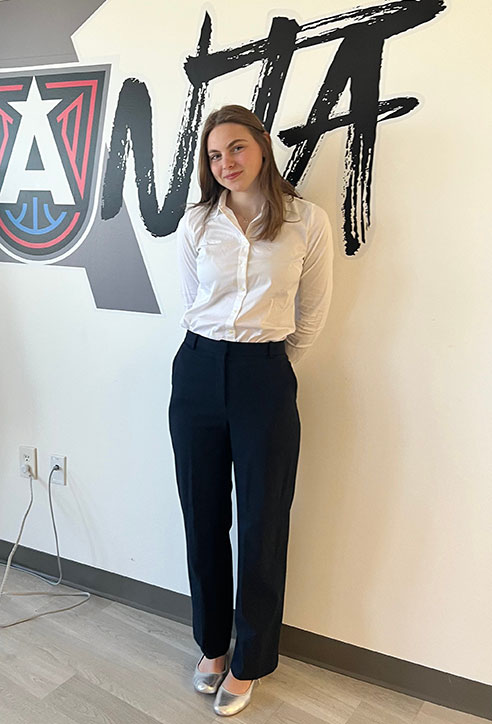
“I joined WISE during my first week on campus, and it immediately became a meaningful community for me. Surrounded by driven, like-minded women who share a passion for working in sports, I’ve found lasting friendships, valuable networking opportunities, and unforgettable professional experiences through this organization.
“One of the most impactful aspects of being in WISE has been participating in immersion trips across the country. These trips provide unique opportunities to engage directly with industry professionals and Syracuse alumni. Our recent trip to Atlanta was particularly special, as it allowed us to explore a sports market outside the Northeast.
“While in Atlanta, exposure to a wide range of organizations gave us a well-rounded understanding of Atlanta’s sports industry from team operations to agency representation and beyond. Additionally, visiting Atlanta was an amazing opportunity because the FIFA 2026 World cup is coming to Mercedes-Benz Stadium, and we heard from multiple organizations about their unique perspective on the event and what role they will play in planning and executing it.
“These immersion trips are more than just site visits; they’re hands-on learning experiences that give us a real sense of what working in different sectors of the sports industry is like. In an increasingly virtual world, having the chance to build face-to-face connections is invaluable. I’m incredibly grateful to be a part of WISE and for the opportunities it has provided to grow both personally and professionally. Thank you to everyone who met with us on this trip, and to everyone who made this adventure possible.”
Kate Bradley’s extracurricular activities in Falk College include WISE Club communications chair, Sport Management Club community outreach chair, Sport Management Club Charity Sports Auction public relations chair for the 2023 and 2024 auctions, research assistant for Assistant Professor Lindsey Darvin’s NIL project, publishing assistant for David B. Falk Endowed Professor Rick Burton, and vice president of partnerships for the Syracuse Sport Group. She’s currently interning for the Wasserman sports marketing and talent management agency in the Brand and Properties department.
Visit the Falk College website to learn more about experiential learning, academic programs, and career opportunities in the Department of Sport Management and the Sport Analytics program at Syracuse University.
The Future of Sport
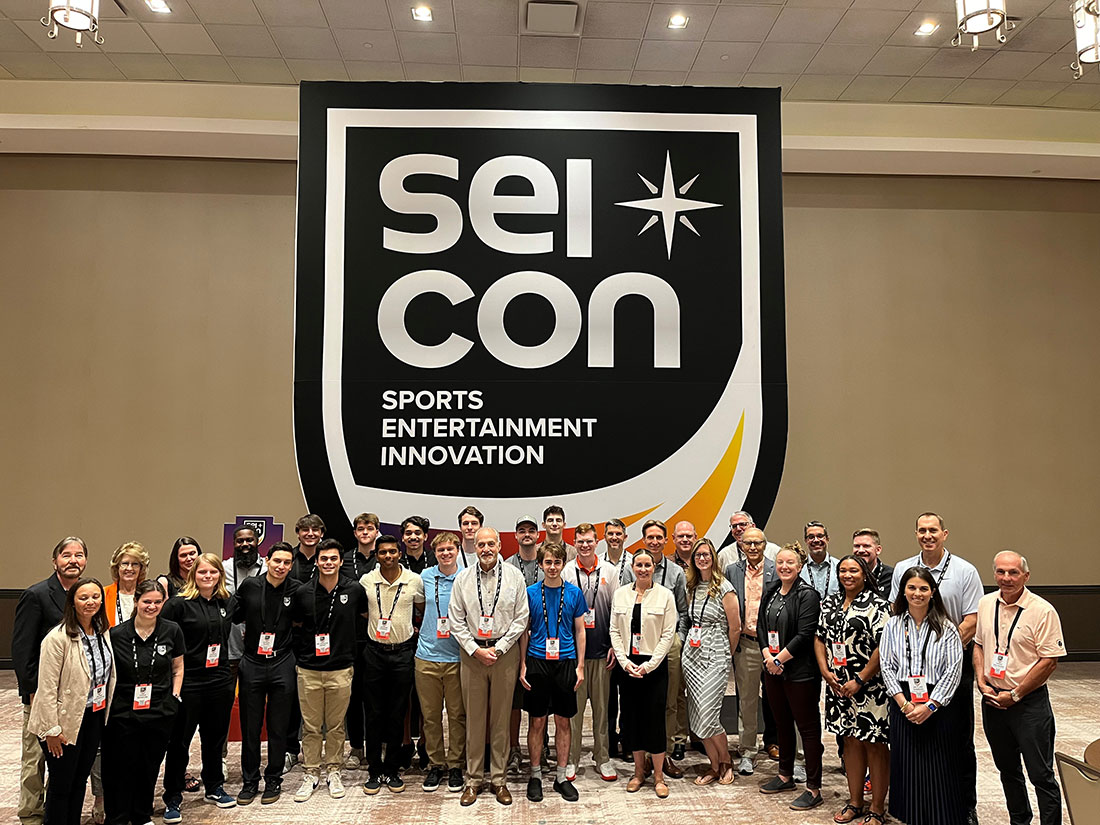
SEICon is a partnership between UNLV Sports Innovation Institute and Syracuse University’s David B. Falk College of Sport, in collaboration with the Las Vegas-based guest experience agency Circle, and it serves as a platform for professionals to discuss strategies and innovations shaping the future of the sports and entertainment industries.
SEICon II will bring together industry leaders from the public and private sectors and academia and feature fully catered lunchtime keynotes, insightful panel discussions, and curated networking opportunities focused on emerging trends, digital transformation, and the future of fan engagement, media rights, sponsorships, and entertainment technology.
All-inclusive registration for SEICon II is now open. Visit the SEICon website to register and to find more information about SEICon II and satellite 2025-26 SEICon events in Houston, London, and Atlanta. Syracuse University alumni will receive $200 off the cost of registration by using the code SU ALUMNI.
“This is your chance to connect with industry leaders, share insights, and explore the latest innovations in sports and entertainment,” says Syracuse University alum and Circle CEO Shawn Garrity. “We’re thrilled to build upon last year’s momentum, bringing together thought leaders for another unforgettable experience. Expect compelling content, intimate connections, and top-notch hospitality that only Vegas can offer.”
Building on the success of its inaugural year, SEICon is moving to the legendary Bellagio Hotel, which is known for its fountains and world-class amenities. This year’s event will focus on key emerging areas within the industry, including women in sports and entertainment, motorsports, and golf.
“We are incredibly proud and excited to host SEICon II at the prestigious Bellagio,” said Jay Vickers, COO of UNLV Sports Innovation Institute. “Returning to Las Vegas and partnering with such an esteemed venue, alongside the invaluable support of our partners, underscores SEICon’s growing influence and our commitment to providing an unparalleled experience for our invited guests.”
Vickers, Garrity, and Falk College of Sport Dean Jeremy Jordan appeared on the Horrow Sports podcast in late May to discuss the partnership between Falk College, UNLV Sports Innovation Institute, and Circle, and the present and future of SEICon.
SEICon will include nearly 30 panel conversations and two keynote speaker events. One keynote is with Oklahoma City Mayor David Holt, who in June will become president of the U.S. Conference of Mayors. The second keynote features two Syracuse University alumni, veteran news and media executive Chris Licht and New York Post CEO Sean Giancola, along with a representative from Gannett/USA Today, the presenting sponsor of SEICon II.
Several Falk College of Sport faculty members will lead panels, including David B. Falk Endowed Professor of Sport Management Rick Burton (The World Cup and the Rise of MLS: A New Era for Soccer); Assistant Teaching Professor of Sport Management Alexia Lopes (Women in Racing); Sport Analytics Undergraduate Director and Professor Rodney Paul (Get with the Program: Entrepreneurship); and Professor of Sports Law John Wolohan (Post House – The Future of College Athletics).
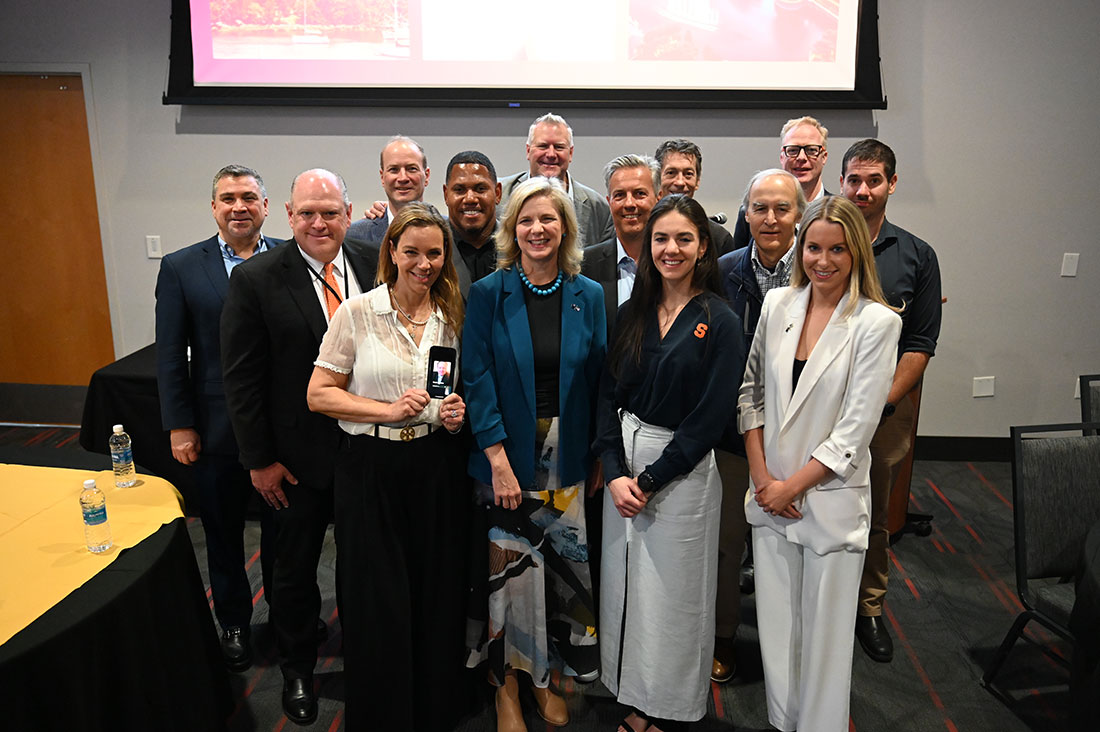
Growing Partnership
The connections between Falk College and UNLV Sports Innovation Institute continue to grow beyond the annual SEICon event.
This past March, the National Rugby League from Australia opened its regular season with men’s and women’s games at Allegiant Stadium in Las Vegas. In advance of those games, SEICon hosted a “Business of Sport” conference for the NRL at the UNLV Sports Innovation Institute that included the signing of a partnership between SEICon and the Australian Sports Technologies Network. Burton, Lopes, and Paul attended the conference, and Paul served as the moderator for a discussion on “The Tech Playbook: Innovations for Shaping the Future of Sports.”
“We are excited about the growing collaborations with UNLV Sports Innovation Institute and Circle for SEICon and the opportunities for our faculty to share their work and research from the programs in the new College of Sport: sport management, sport analytics, esports, exercise science, and nutrition,” says Rodney Paul, Director of the Sport Analytics program and a professor in the Department of Sport Management at Falk College. “We are most excited, however, to show off our greatest asset, our students, and provide them with an unparalleled experience in one of the most dynamic sports and entertainment markets in the world.”
Analysts predict the global sports market to reach $2 trillion, which is 2% of the $100 trillion world economy, bolstered by an influx of money from new sources, emerging technologies, and growing demand. Already the entertainment capital of the world, Las Vegas has become an emerging sports destination and is perfectly positioned to host an annual conference focused on the intersection of sports, entertainment, and innovation.
The inaugural SEICon in 2024 included 775 attendees and 183 speakers ranging from presidents and founders to venture capitalists and government officials. Visit the SEICon website to learn more about the inaugural 2024 event and what’s planned for 2025 and beyond.
David B. Falk College of Sport
On July 1, 2025, Syracuse University will make history by launching the David B. Falk College of Sport – the first college on a high-research activity (R1) campus dedicated exclusively to sport-related disciplines. Named after visionary benefactor and legendary sports agent David B. Falk, this new college stands at the intersection of academic excellence and industry innovation. The college will unite our distinguished programs in sport management, sport analytics, exercise science, nutrition, and esports (offered jointly with the prestigious Newhouse School of Public Communications) under one dynamic academic umbrella.
‘The Rolls-Royce of Falk’
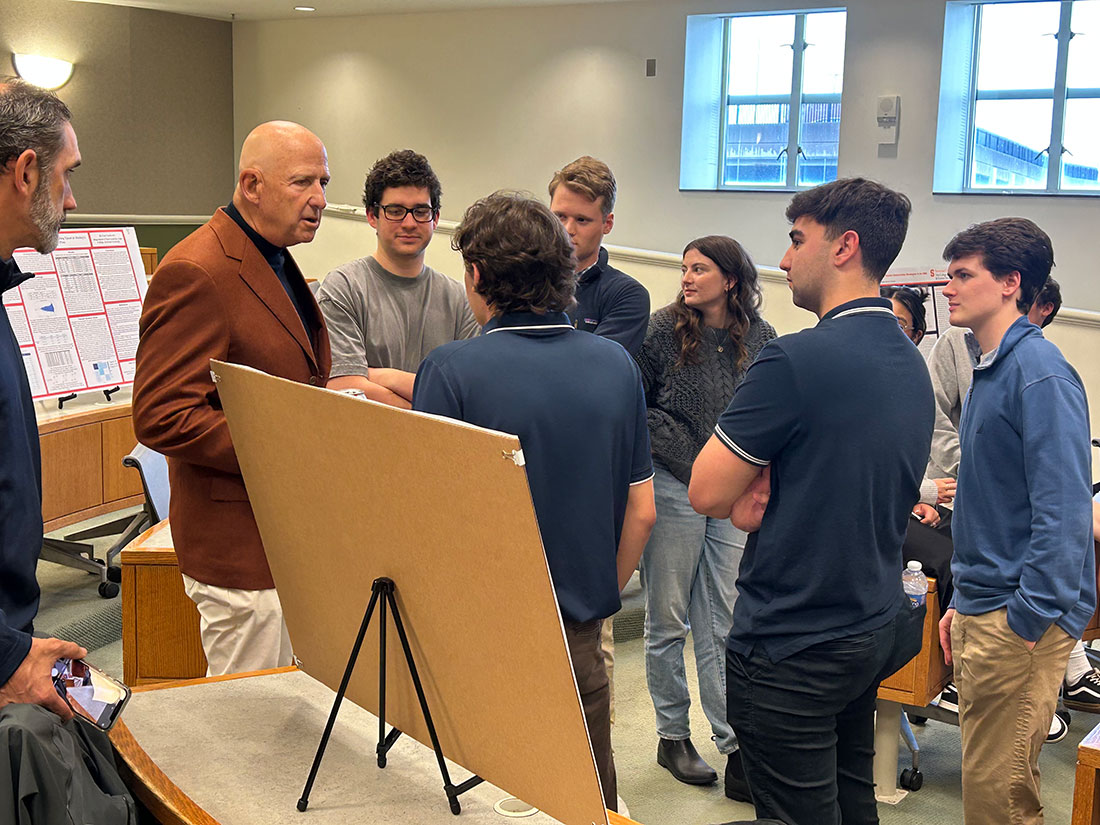
“I think the Rolls-Royce of Falk College, undoubtedly, is the analytics program,” Falk College benefactor David Falk said to a room of senior Sport Analytics students and their families during their Capstone poster presentations. “We’ve won virtually every analytics competition for the last few years.”
That was certainly true during the Spring 2025 semester, when Falk College students from the Sport Analytics program were victorious at multiple analytics and research competitions and presented findings at several highly regarded conferences around the country. Below is a recap of the semester’s highlights:
SABR Analytics Conference
Sport Analytics students Owen St. Onge, Payton Smith, Andrew Diamond, Jonah Soos, and Jacob Kalamvokis won their room in the Diamond Dollars Case Competition, during which teams compete by preparing an analysis and presentation of a baseball operations decision similar to what a team’s general manager and staff would do in Major League Baseball.
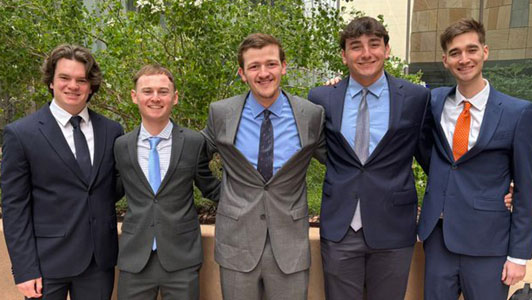
Two students, Nathan Backman and Brett Cerenzio, took part in the Society for American Baseball Research (SABR) Analytics Conference research competition, with Backman winning best student presentation for his research entitled “Baseball Cinematography: Using Open Source CV Algorithms to Track and Quantify Pitcher Mechanics.”
Syracuse University Football Blitz
Sport Analytics students won every room of the Football Blitz competition, including one room of entirely first-year students. Sport Analytics students were also named winners of the overall competition.
The Football Analytics Blitz tasks students with a current football analytics prompt. They are given a week to put together a presentation for football analytics professionals. The competition brought together students from 25 different universities and judges from eight NFL teams.
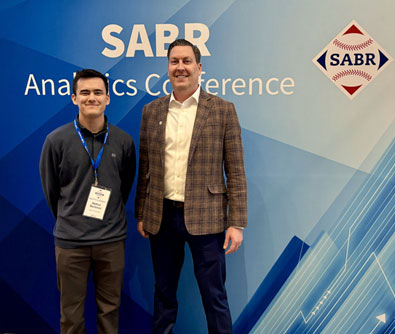
The winning students were:
Room 1: Charlie Maddux, Jonah Soos, Nathan Backman, Austin Ambler, and Zach Seidel.
Room 2: Nick Wolfe, Jameson Bodenburg, Jacob Kalamvokis, and Jessica Fackler.
Room 3: Noah Bair, Jimmy Roberto, Carter Pointon, Alex Percey, and Braden Hines.
MIT Sloan Research Paper Competition
Research conducted by Sport Management major Alivia “Ava” Uribe, a member of the Syracuse University women’s soccer team, with Sport Analytics professors Justin Ehrlich and Shane Sanders about the location of penalty kicks won the Research Paper Competition at the prestigious MIT Sloan Sports Analytics Conference. Their paper won over thousands of entrants and six other finalists, and Uribe became the first female lead author in the conference’s 19-year history to capture the competition.
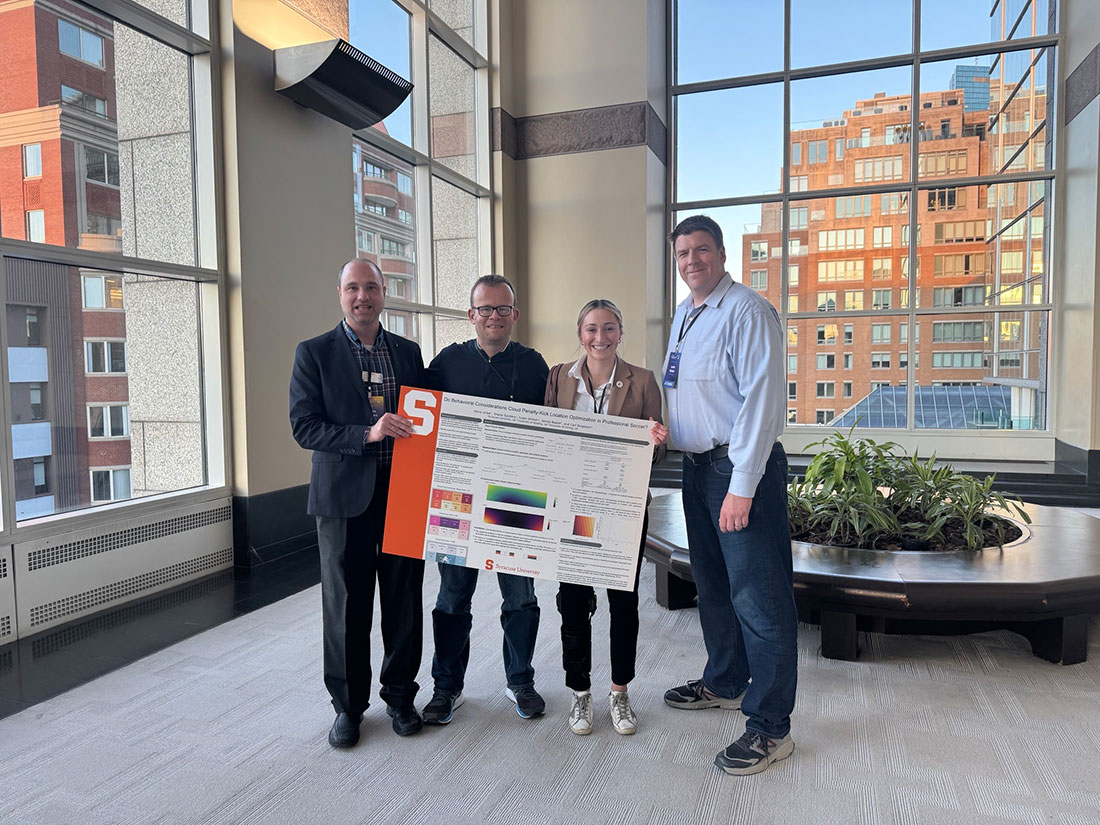
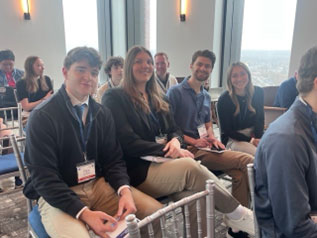
Connecticut Sports Analytics Symposium
Sport Analytics students Danielle Napierski, Dan Griffiths, and Brett Cerenzio were named runners-up in the Major League Baseball Data Challenge at the Connecticut Sports Analytics Symposium (CSAS).
Alivia Uribe and Shane Sanders also presented their penalty kick research at CSAS.
American Soccer Insights Summit
Sport Analytics students Sebastian Bush and Theo Schmidt presented their work, “Dual Dependency: Analyzing the Winger and Wingback Relationship,” at the American Soccer Insights Summit.
Sport Analytics students Christopher Marfisi, Evan Vassilovski, Walker Oettl, and Ryan Severe were named finalists for their work on the given prompt and traveled to Washington, D.C., to present their findings.
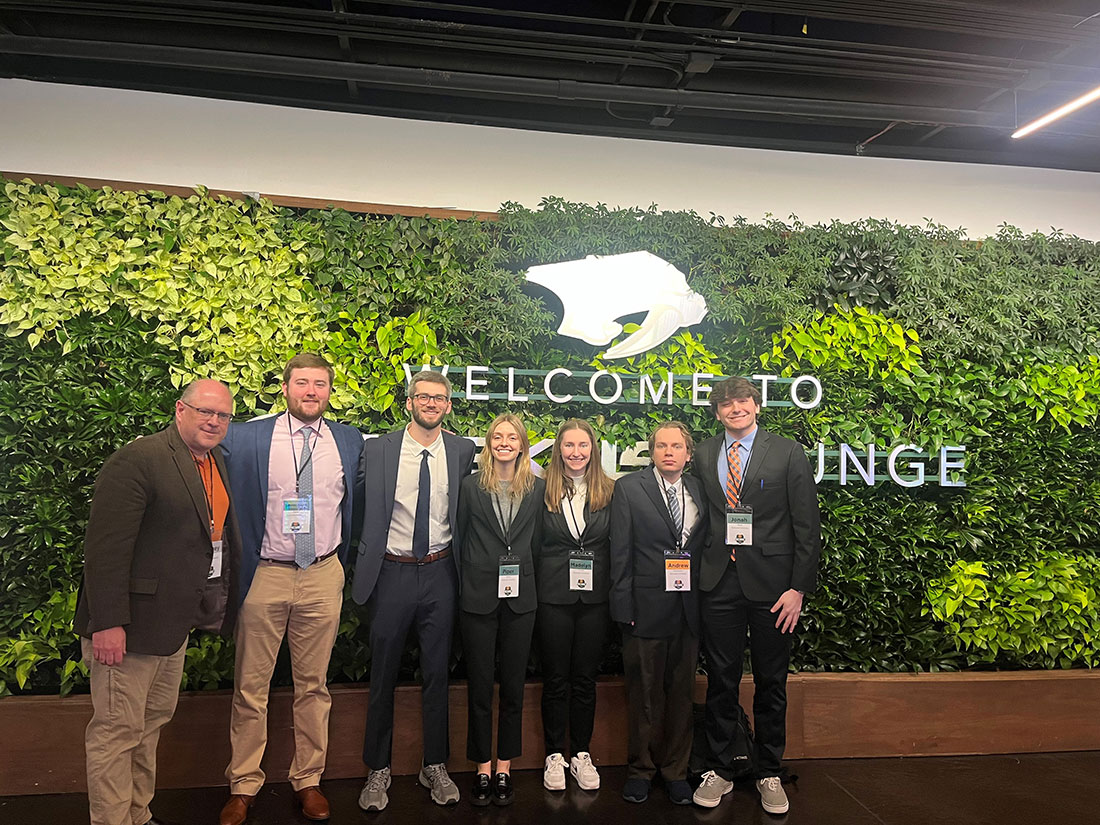
National Collegiate Sports Analytics Championships
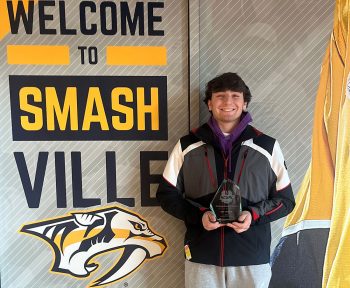
Falk College student Jonah Soos won the undergraduate division individual championship, while the undergraduate team of Soos, Hunter Geise, Piper Evans, and Maddy Forster finished second in the team competition. Two graduate students, Andrew Odnoralov and Owen Brown, also competed–a first for representatives from Falk’s graduate programs.
At this event, students gave five-minute presentations based on analysis of provided data related to brands, teams, and athletes. Judges chose a winner based on statistical analysis, data visualization, actionable insights, communication, and integrity.
Cincinnati Reds Hackathon
Teams were tasked with modeling a projection system that predicted total plate appearances and batters faced for Major League Baseball players in the 2024 season based on their past data. Sport Analytics students Dan Griffiths, Ben Resnic, Hunter Cordes, Jared Weber, and Josh Davis won the Hackathon, with two other Falk teams being named finalists.
To learn more academic programs, experiential learning, and career opportunities in sport analytics and sport management, visit the Falk College website.
Class of 2025 Sport Management and Sport Analytics Awards
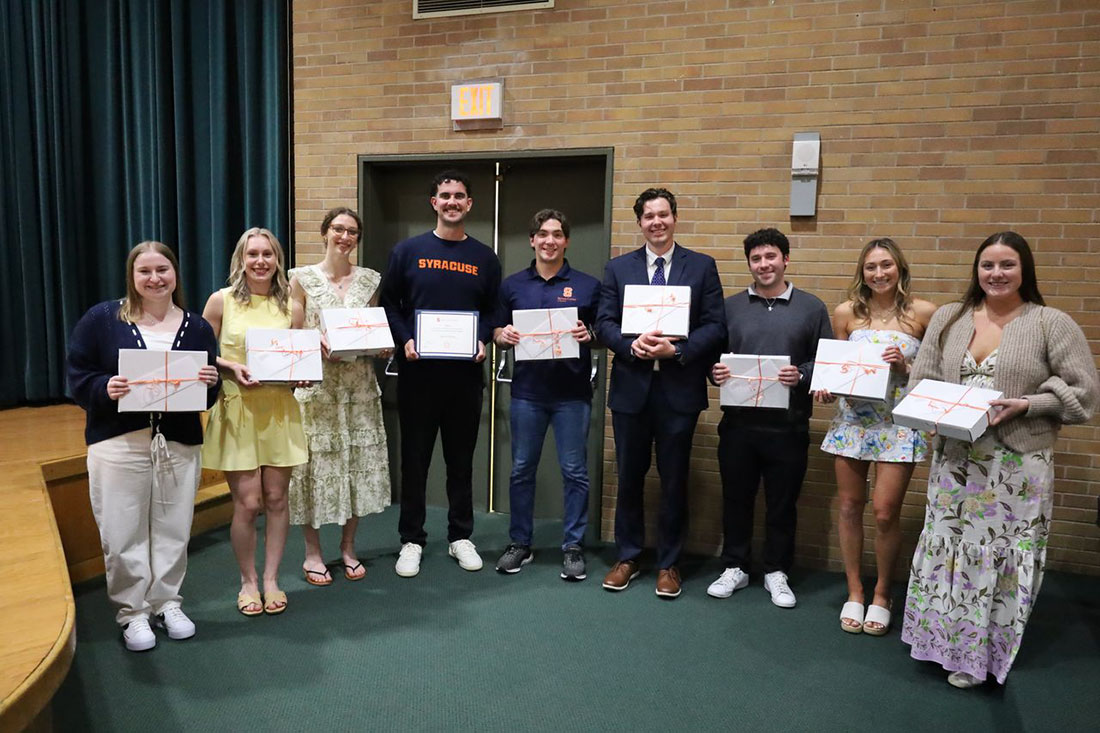
Falk College’s Department of Sport Management is pleased to recognize the outstanding work of its undergraduate students in the Class of 2025 in sport management and sport analytics.
The Department of Sport Management held an awards celebration May 9, 2025 in Falk College. Students who were recognized for academic excellence, philanthropic work, and post-graduate plans included:
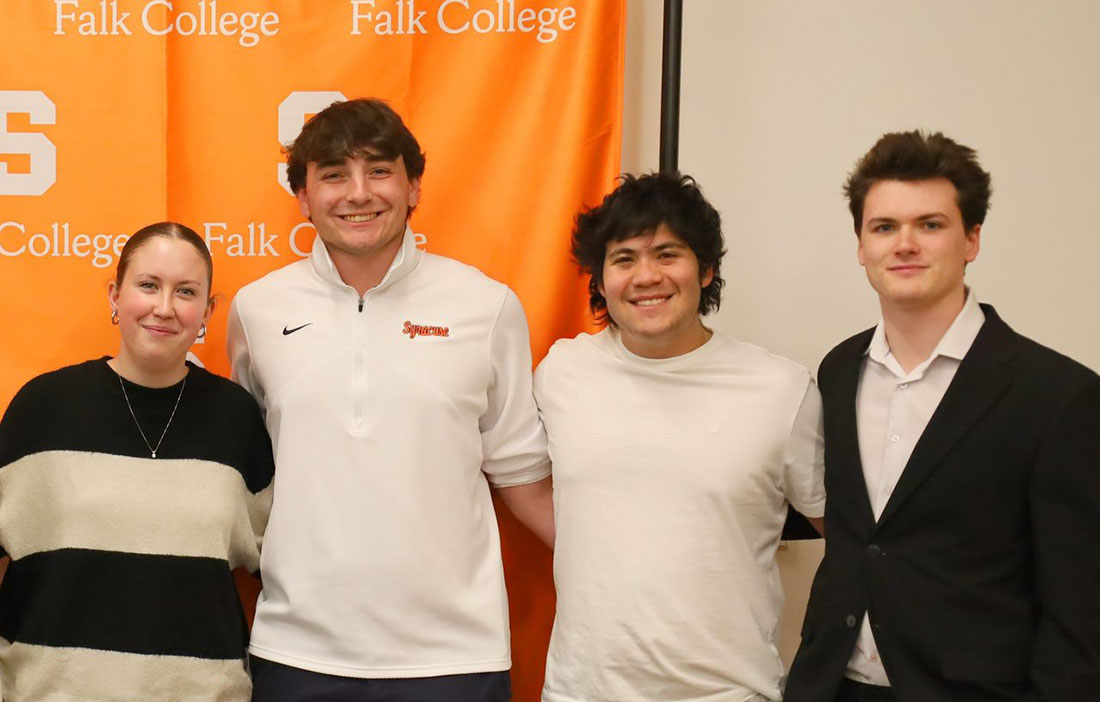
Falk College Scholars
Falk College Scholars represent undergraduate students in Falk College who display academic excellence, exceptional campus and community engagement, and personal integrity.
Recipients: Benjamin Jennings, Sport Analytics; Jarrett Markman, Sport Analytics; Anna Pierce, Sport Analytics; and Jonah Soos, Sport Analytics.
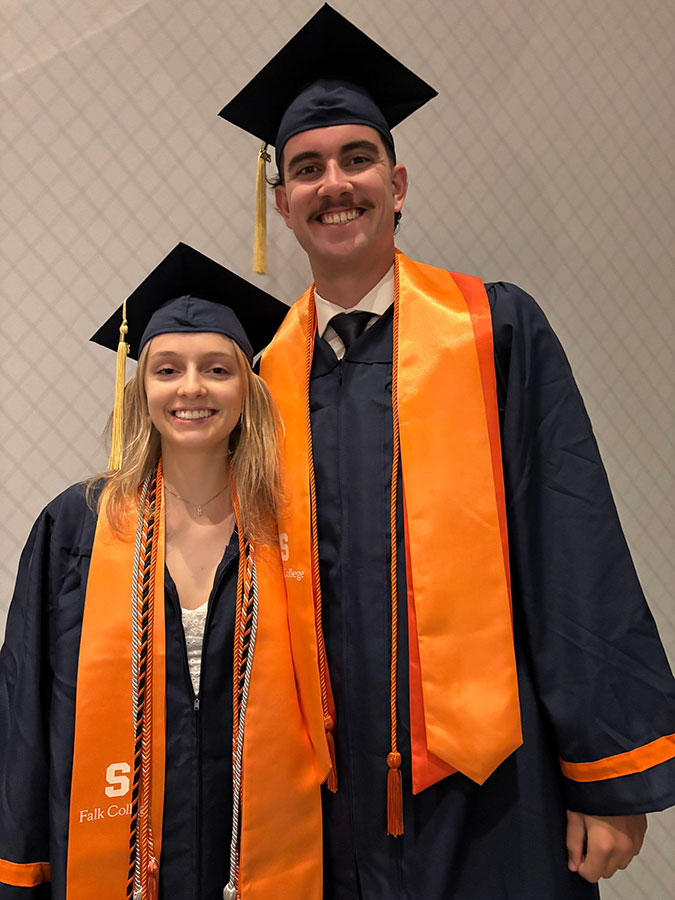
Senior Class Marshals
Senior Class Marshals have excelled during their time on campus and exemplify the spirit of the senior class. The selection committee assesses the nominees on scholarship, academic honors, student organization involvement, and campus/community service.
Sport Management Department Marshal: Stevan Chuck
Sport Analytics Department Marshal: Piper Evans
Sport Analytics Berlin Scholars
Recipients: Isobel Alfonso, Nathan Backman, Piper Evans, Madelyn Forster, Hunter Geise, Adelaide Gilley, Fred Gullo, Caitlin Kohlmeier, Hunter Kuchenbaur, Chris Marfisi, Jarrett Markman, Anna Pierce, Ryan Severe, Zachary Silverstein, Jonah Soos, and Evan Vassilovski.
Sport Management Director’s Academic Achievement Award
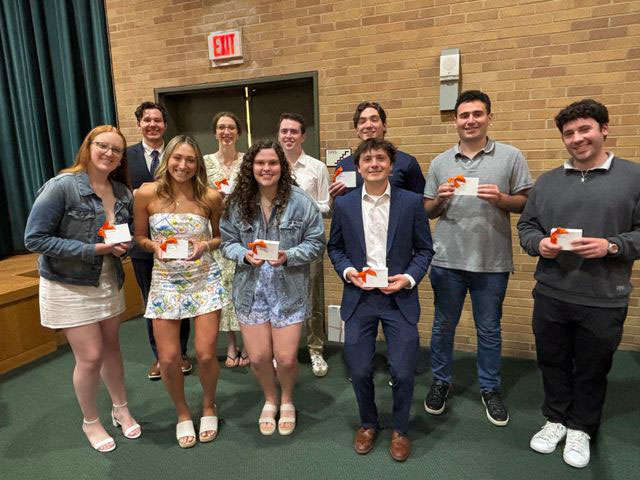
Recipients: Nicholas Albanese, Jared August, Nathan Blashka, Ian Donella, Griffin Goldberg, Jack Hitter, Katherine Holler, Emma Isaacson, Matthew Kahan, Leo Lau, Benjamin Lichtenstein, Frank Marciano, Livia McQuade, Kirstyn Schechter, Sawyer Shalit, Jacob Tilem, Alivia Uribe, and Tynan Weathers.
Excellence in Sport Management Award
This award is presented to a student with a GPA of 3.5 or higher; is a strong ambassador for the department; demonstrates exemplary service to the community; possesses strong professional sport industry experience; and is a mentor for their fellow Sport Management majors.
Recipient: Livia McQuade
About Livia: Livia embraced the entire mantra of our program, excelling both in and out of the classroom. She completed the program in just three years, maintaining a 4.0 GPA while experiencing everything Syracuse has to offer students for professional and personal development. She was a leader of the Sport Management Club and held four executive positions, including co-chair of the Sports Charity Auction. Livia completed internships both in and outside the Syracuse community, and spent her Senior Capstone this spring with the Kansas City Sports Commission working on the upcoming World Cup in 2026. Livia has been offered a full-time job as an events assistant with FIFA World Cup ’26 Kansas City.
Sport Management Academic Promise Award
This award is presented to a student who will attend graduate school; has attained a GPA of 3.5 or higher; is a strong ambassador for the department; demonstrates exemplary service to the community; and possesses strong professional sport industry experience.
Recipient: Jacob Tilem
About Jacob: Jacob was a key member of two case study competition teams that represented the department at the Sport Marketing Association and National Sports Forum conferences (his team placed second at the NSF). Jacob found his passion with the Name, Image and Likeness (NIL) space when he came into the sport management program. He is a successful entrepreneur as co-founder of Slice Sports Management, an NIL marketing agency he launched as a student in 2023 that has been successful with clients in football, basketball, lacrosse, and track and field. He also interned with Sponsor United and 1 of 1 Agency. Jacob plans to attend law school in the fall to continue his education.
Sport Management Academic Honors Award
Recipient: Nathan Blashka
About Nathan: Nathan completed his Senior Capstone this semester with Leinster Rugby working with the club in Dublin, Ireland. While at Syracuse University, he was an Intramural Sports Supervisor and interned with The Basketball Tournament (TBT), the Lake County Captains baseball team, and Young Money APAA Sports. He was a member of the Sport Management Club and will graduate with a minor in Public Communications.
Matt Brodsky Philanthropic Excellence Award
This award is named after Matt Brodsky, a sport management major who passed away unexpectedly after the Fall semester of his freshman year in 2013. In his honor, the department created an award that stems from his philanthropic excellence while he was a student at Syracuse University. It is presented to a student who displays outstanding service to both the campus and greater Syracuse communities; demonstrates exemplary citizenship and philanthropic qualities; serves as a mentor for students by establishing outreach opportunities for the Department and University; and is an exemplary representative of Sport Management.
Recipient: Erin Moore
About Erin: Erin served as president of the Women in Sports and Events Club, and was a member of the Sport Management Club and University 100. Erin interned with Syracuse Athletics Communications, Campus Ink, the NIL Store, and 3XL Sports Management. Erin completed her Senior Capstone with the Nashville Predators as a social media intern. She is a member of the Syracuse Renée Crown University Honors Program.
Sport Management Professional Engagement Award
This award is presented in recognition of a student’s real-world experience; work ethic; dedication; professional demeanor; and career development as an undergraduate student and representative of the Department of Sport Management. This student’s outstanding academic achievements, coupled with strong citizenship and community service, typify the hard work, dedication, and preparation that the student made throughout their academic career at Syracuse University.
Recipient: Jack Hitter
About Jack: Jack has a double minor in Business and Emerging Sport Enterprise. He served as a manager for the Syracuse University men’s basketball team, and interned with the Boston Celtics. Jack completed his Senior Capstone with the Philadelphia Eagles last fall. He is a member of the Renée Crown University Honors Program at Syracuse.
Jason Morales Perseverance in Sports and Life Award
This award is named in honor of Jason Morales, a sport management student who passed away while completing his Senior Capstone in New York City in 2013. This award has been given in Jason’s honor since 2014. In Jason’s honor, this award is presented to a student who has demonstrated persistence, perseverance, and a positive motivation throughout their academic career while striving to be their best when confronted with life’s challenges. Jason overcame many challenges while at Syracuse University and was just six weeks from graduation when he passed away.
Recipient: Elizabeth “Justy” Carruthers
About Justy: Justy came to Syracuse with a passion to work in football, and she gained experience in sponsorship, marketing, and NIL prior to getting involved with football. She started working with the Syracuse University football team as a recruiting intern and was promoted to her current role as Director of On-Campus Recruiting while still a student and completing classes. Justy became the youngest Director of On-Campus Recruiting in college football. Justy is continuing to pave the way for future women to work in football and sharing her experience with other students so they can follow her lead.
Sport Management VIP Award
This award is presented to a student with outstanding service to the department; has engaged in a variety of experiential learning and sport industry experiences; actively volunteers to serve the department and University on a regular basis; demonstrates strong professionalism and outstanding character; and serves as a role model for Sport Management majors.
Recipient: Brooke Siket
About Brooke: Brooke has been an integral part of the department since she stepped foot on campus. She served as a Facilities and Game Management Intern for Syracuse University Athletics, and a Falk College Peer Advisor and Falk Ambassador. She is an active member of the Sport Management Club and the Women in Sports and Events Club. During her time here, she could be found working at a Syracuse sporting event on campus, helping with prospective students, and mentoring sport management students. This past year, Brooke volunteered at both the New York City Marathon and Boston Marathon. Brooke will complete her Senior Capstone this Summer in stadium operations with The Savannah Bananas.
Kate Veley Civic Engagement and Social Responsibility Award
Kate Veley worked at Syracuse University for more than 15 years and was instrumental in the planning of the annual Sports Charity Auction. This award is presented to a student who has given back to the community they’ve called home for the past four years, and has continually demonstrated strong volunteerism and philanthropic effort to improve the lives of others within the greater Syracuse community.
Recipient: Tynan Weathers
About Tynan: Tynan served as the co-chair for the 2024 Sport Management Club’s Annual Charity Sports Auction that raised $59,000 for the Syracuse Rescue Mission. He was a mentor to the younger club members and spent countless hours working on the auction. Tynan interned with the National Baseball Hall of Fame and the Syracuse Crunch. He completed his Senior Capstone this Spring in Australia with the Twenty3 Group sports and entertainment marketing company. He has a minor in Business and is a member of the Renée Crown University Honors Program at Syracuse University.
Patrick Ryan Innovation in Sport Award
This award is named after Professor Emeritus Patrick Ryan, who taught at Syracuse University for 15 years before retiring in 2021. He taught and created all of the Sport Technology courses for the department. Prior to coming to Syracuse, Professor Ryan worked in the technology industry for more than 30 years. This award recognizes a student’s entrepreneurial spirit and academic excellence while utilizing innovation and technology to enhance their skills.
Recipient: Alivia Uribe
About Alivia: Alivia is a member of the Syracuse University women’s soccer team and an Atlantic Coast Conference Academic All-American. She has a minor in Sport Analytics. In March, she presented research with Sport Analytics professors at the prestigious MIT Sloan Sports Analytics Conference, where the research was named “Best in Field.” Alivia is the first female lead author on the research paper competition winning team in MIT Sloan’s 19-year history. She has interned with the NFL Draft and the VaynerSports agency, and is a member of Syracuse University’s Student Athlete Advisory Council. Alivia will complete her senior Capstone this summer with Ballard FC, and then resume her education at Syracuse University in the Master of Finance program while continuing to play soccer for the Orange.
MLSuccess
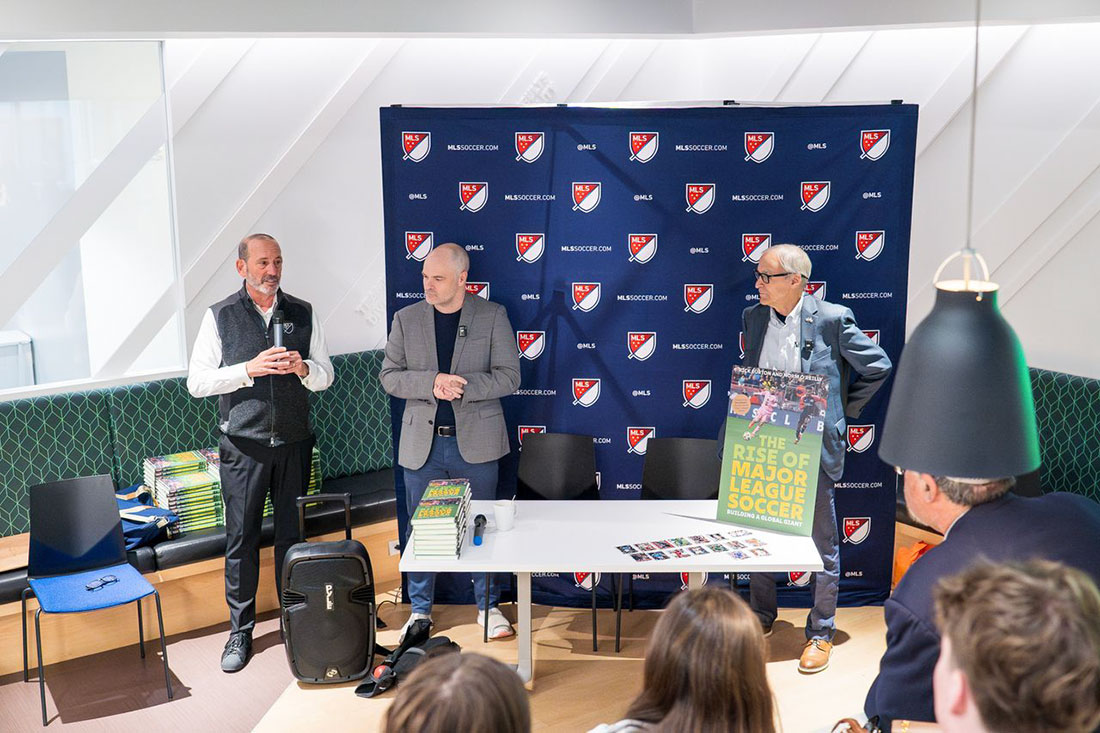
With the 30th anniversary of Major League Soccer (MLS) fast approaching, it’s obvious MLS has come a long way from its modest beginning in 1996. Once considered an underdog in the American sports landscape, the league has grown into a global player. MLS now draws international stars, record-breaking crowds and major media deals.
It’s also become home to a number of former Syracuse student athletes, with Kamal Miller, Deandre Kerr, Alex Bono and Miles Robinson all suiting up for MLS teams. But behind the headlines and highlight reels is a deeper story.
“There’s a long history of failed soccer leagues in North America,” says Falk College of Sport and Human Dynamics Professor Rick Burton, who has spent years studying the evolution of MLS. “Many investors, owners and even players lost a lot of money before MLS finally found its footing. That context is important—it shows just how remarkable the league’s success really is.”
This success has taken 30 years to grow. The league started in 1996, with professional soccer returning to the states for the first since 1984, when the North American Soccer League ceased operations.
“What amazed us was just how much MLS had evolved,” Burton says. “When the Apple deal was announced and Inter Miami signed Lionel Messi, the numbers—attendance, rising team values, internationality of players—really stood out.”
Burton, along with Norm O’Reilly, a professor at the University of New England, have studied the rise of soccer’s popularity in the United States, specifically MLS, one of the most diverse leagues on the planet, O’Reilly says. “It’s been that way for years, and that diversity is a huge part of its appeal both domestically and internationally,” he says.
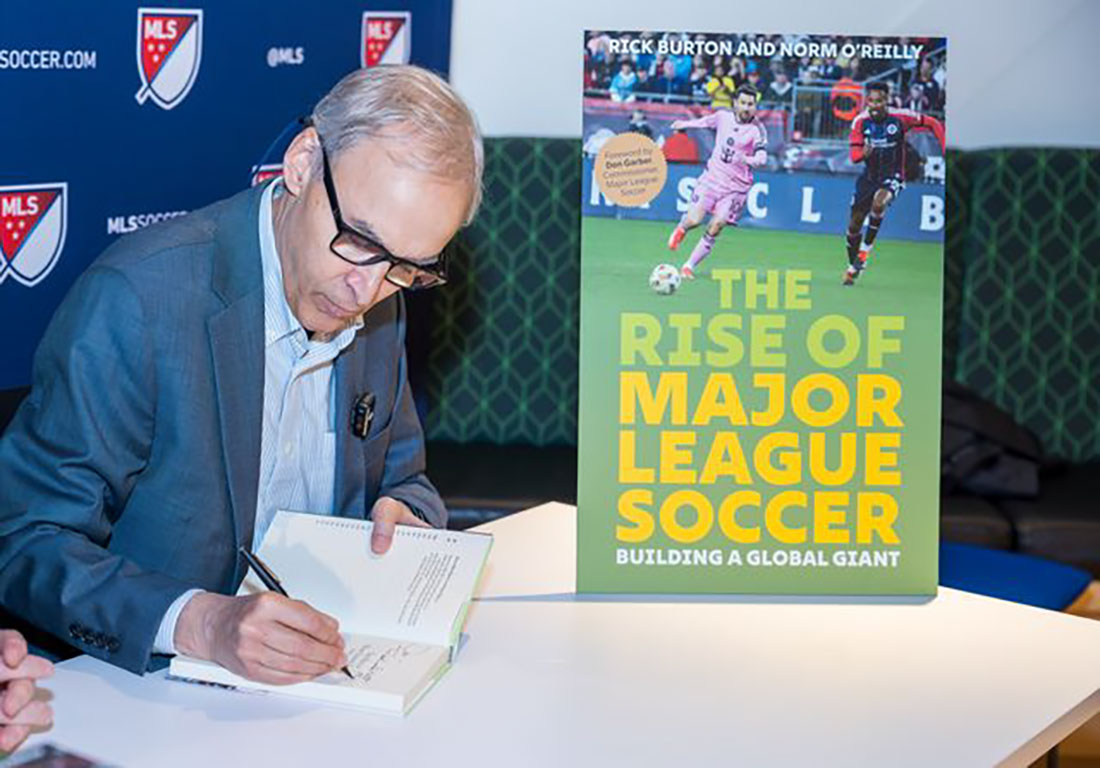
That success is the focus of a new book, “The Rise of Major League Soccer,” co-authored by Burton and O’Reilly and released this week. It offers a comprehensive and research-driven look at how MLS has grown into one of the world’s most dynamic sports leagues, drawing on a wide range of sources, including exclusive demographic data provided by MLS itself.
Both Burton and O’Reilly have also explored how the league has strategically positioned itself for long-term success. Soccer-specific stadiums, a global media partnership with Apple and the arrival of global icons like David Beckham and Lionel Messi have all played a role in reshaping how MLS is perceived.
With the U.S. set to host the FIFA Club World Cup in 2025 and the FIFA World Cup in 2026, the timing for MLS couldn’t be better. “MLS is no longer just a league with potential,” says Burton. “It’s a case study in how vision, strategy and persistence can build something truly global.”
“There are key takeaways, learnings and best practices that sport business professionals can apply in their own work,” says Burton. “We wanted this to be both a compelling story and a useful resource.”
A Syracuse University News story by Keith Kobland originally published on May 7, 2025.
2025 Falk College Convocation
The celebration included two members of Syracuse University’s Board of Trustees, Ken Pontarelli and Deborah Leone, who had family members graduating from Falk, and a surprise visit from Otto the Orange, who helped Falk College Dean Jeremy Jordan take a selfie in front of all the graduating students!
Watch the slideshow above for photos from Convocation, and visit the Syracuse University Commencement website to watch the full Falk Convocation ceremony.
Guest speaker Benita Fitzgerald Mosley, an Olympic gold medalist and visionary executive, delivered an inspiring speech during which she encouraged graduates to ask “Why not me” when they dream about the goals they have set for their careers and personal lives. Here’s a video and story to learn more about Fitzgerald Mosley.
Dean Jordan reminded the graduates that they follow generations of Syracuse University alumni who refused to settle, pursued innovation, and conquered the challenges of their time. Now, it’s their turn.
“The worlds of sports, human performance, and applied and behavioral health are evolving rapidly,” Jordan said. “To become effective leaders, you must evolve with them—and I have every confidence you will.
“At Syracuse University and Falk College, we have strived to prepare you to meet these challenges head-on and become the change agents our world desperately needs,” he continued. “The education you’ve received here has equipped you with the tools to make meaningful contributions in your chosen fields. Your unique perspectives, innovative thinking, and commitment to excellence will undoubtedly lead to breakthroughs that improve lives and communities.”
Class of 2025 Falk College Scholars
Seven members of the Class of 2025 have been named Falk College Scholars–the highest academic award conferred by the Falk College of Sport and Human Dynamics on graduating seniors. Falk Scholars represent undergraduate students who display academic excellence, exceptional campus and community engagement, independent research and creative work, innovation in their disciplinary field, and personal integrity.
We asked the Class of 2025 Falk Scholars to describe their most impactful experiences at Syracuse University. Here’s what they wrote:
Grace Elizabeth Brashears (Human Development and Family Science)
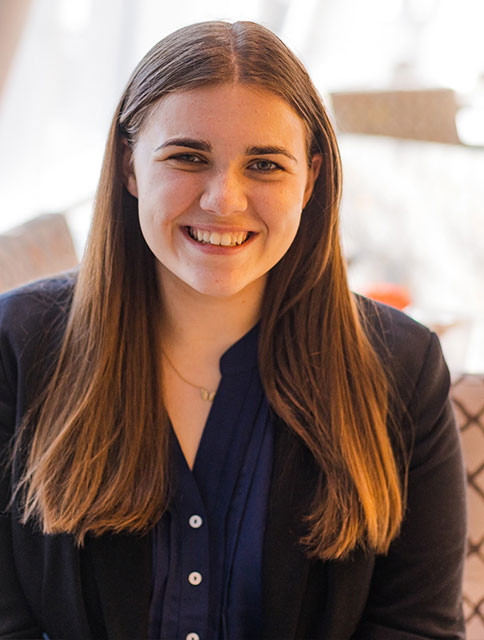
Throughout my time at Syracuse University and Falk College, I have been honored to take part in various service initiatives that help the very community I have called home for the last four years. The most influential of these was my work with Upstate Golisano Children’s Hospital as a Child Life Practicum student, and as president of OttoTHON at Syracuse University. In my time with OttoTHON, I have led a generation of students to raise over $400,000 for Upstate Golisano Children’s Hospital.Alongside my work with Golisano Children’s Hospital, I have been given the opportunity to impact my community through assisting in research that is developing more accessible research ethics training for individuals with intellectual and developmental disabilities. Additionally, I have worked with various organizations in Syracuse, including the Boys and Girls Club, RISE (Refugee and Immigrants Self-Empowerment program), beneath the surFACE at Upstate Cancer Center, Syracuse Red Cross, the Children’s Advocacy Center, Upstate Community Hospital, and more.
These opportunities, heavily supported by Syracuse University and Falk College, have successfully set me up for a lifetime of service and philanthropy, and a fulfillment of my purpose to use my education to benefit the lives of those around me. I will never forget my time at Syracuse and a part of me will always be here on the hill. Go Orange!
Xuezhu “Stephanie” Hua (Nutrition Science)
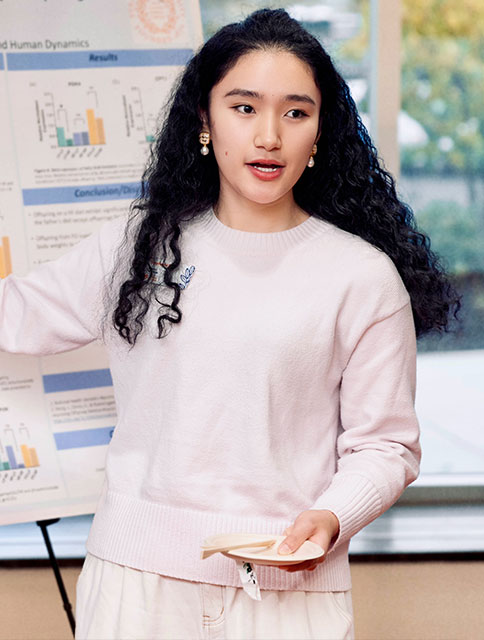
When I was a sophomore, I led a dorm room recipe project through the Office of Student Services in Falk College. The goal was to introduce healthy, easy-to-make snacks that people could take with them to class or work. I created three recipes—chocolate bark, microwave cake, and banana wraps—and prepared 100 samples. I presented these to students and faculty from Falk College, explaining the nutritional benefits and preparation methods. I found this experience incredibly rewarding and empowering as it allowed me to apply my knowledge to help others improve their health and well-being. It instilled in me a lasting commitment to use my expertise to make a meaningful impact in the community.
Another inspiring experience was my honors thesis done in Dr. Latha Ramalingam’s lab, where I investigated the effects of fish oil in reducing paternal obesity and improving muscle health in male offspring. This project was both inspiring and transformative—it was where I discovered my passion for biomedical science. Combined with foundational coursework such as Dr. Margaret Voss’s biochemistry class, anatomy, and physiology, I developed a deep passion and appreciation for the complexity and intricacy of human metabolic physiology—and the many avenues through which we can address disease. These experiences shaped my path toward studying metabolic diseases and cellular metabolism, fields where my passion aligns with pressing global health challenges.
Benjamin Lanza Jennings (Sport Analytics)
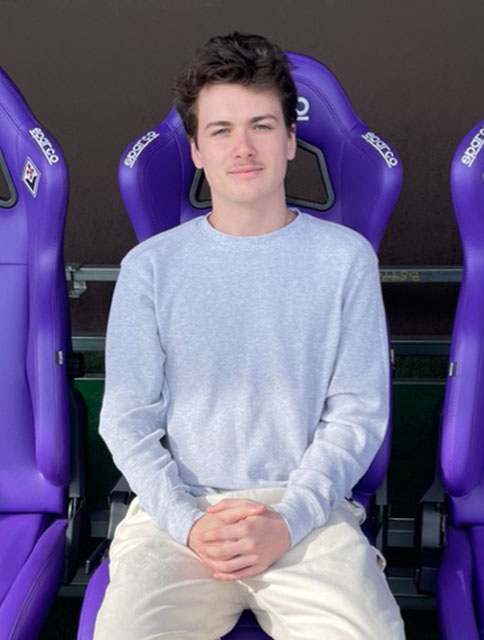
Being named a Falk Scholar is an incredible honor and a reflection of the meaningful experiences I have had at Syracuse University. I have always been passionate about working in sports, and Falk College gave me the tools, support, and guidance to pursue a career in sport analytics.One of the most memorable experiences was traveling to Italy as part of the first Sport Data in Italian Football course. I learned a ton about analytics in a global context, was immersed in the Italian culture, and had the opportunity to deliver a data-driven presentation to the Bologna FC professional soccer team.
Working with Syracuse’s football and women’s soccer teams gave valuable hands-on experience in sports I am truly passionate about. Winning the 2024 Syracuse University Basketball Analytics competition helped me grow both technically and creatively. All of these opportunities provided me with the skills and confidence to succeed with professional organizations.
I am incredibly grateful to the professors, advisors, and staff at Falk College who encouraged me, opened doors, and helped me prepare for what’s next. Syracuse University and the Sport Analytics program made it possible to turn my passion into a path forward in the sports industry.
Jarrett Markman (Sport Analytics)
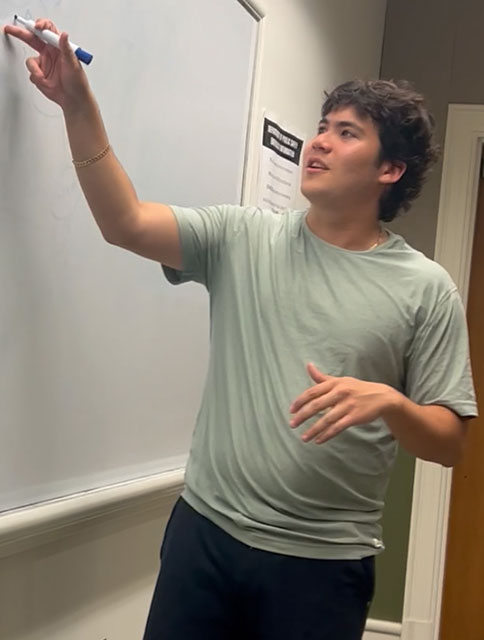
The most impactful experience I’ve had at Syracuse University was the opportunity to develop a passion for learning. In the Sport Analytics program, I was able for the first time to blend my passion for academics (math-based work) with one of my favorite hobbies, sports. The program provides many learning opportunities, such as the many academic clubs presented to students in the major.Given my background playing tennis at a high-level, I was interested in creating my own club and combining my abilities as a tennis player and sport analyst. Due to the lack of popularity in tennis across the country compared to other sports, we built a close-knit group of members who discussed a variety of the technical and physical aspects of tennis that come from the perspective of playing, watching, and analyzing.
In our club, we utilized the knowledge gained from our coursework and applied that to various aspects of tennis. The Tennis Analytics Club has heightened my passion for learning, leveraging the power of data science (notably statistics), machine learning, and programming to identify the various ways to formulate powerful insights.
Anna Meara Pierce (Sport Analytics)
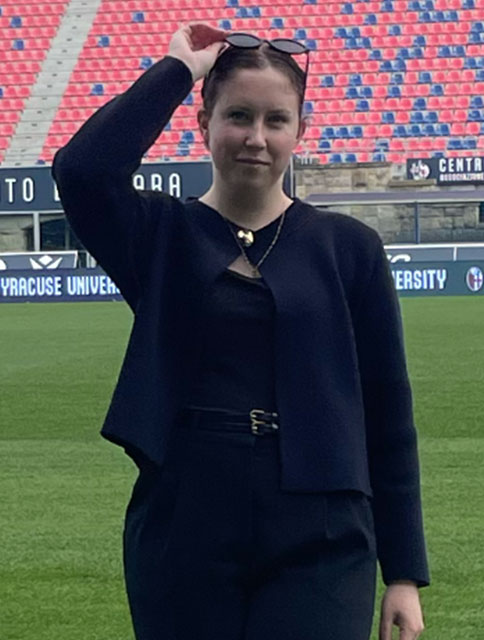
A lot of the impactful experiences I’ve had at Falk and Syracuse University have been on a smaller level, including the support of my professors and advisors. However, I’ve been lucky enough to go on several department-sponsored trips to conferences or other sport-related events.One such event was the 2024 NFL Draft in Detroit. The Sport Analytics and Sport Management teams used a previous connection with one of the community tourism-related groups organizing the draft to take six of us (three analytics students and three management students) to work the draft in areas from combine-related fan activations to manning the information desk. While I already knew that I wanted to work in fan engagement within the sport, the draft opened my eyes to the potential reach and success of a tent-pole event such as the draft, as well as to the world of fan engagement and events within football.
Ultimately, this trip showed me the possibilities for impact on the business side of the NFL and its teams, driving me to take a position with the Green Bay Packers in their business analytics department for post-graduation.
Nicole Yanza Shanguhyia (Public Health)
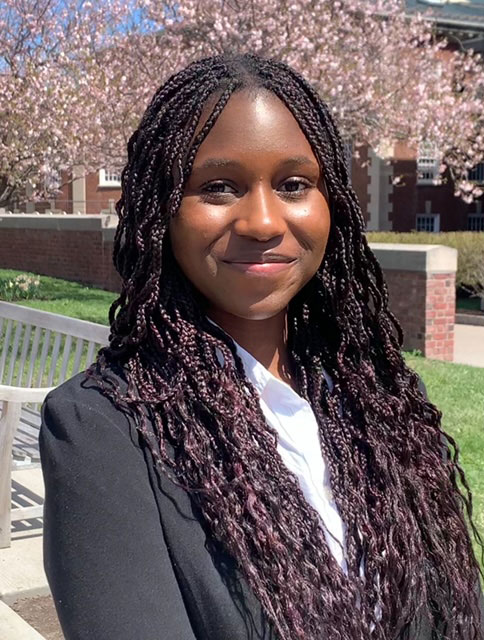
During my time at Syracuse University I’ve had the opportunity to meet a lot of wonderful people, but none quite like the members of the Student Association of Public Health Association. The designated student organization for the Department of Public Health, better known as SAPHE, was first introduced to me in my sophomore year.When Professor Lisa Olson-Gugerty announced she was reviving the student-run club, I wasu admittedly hesitant to join. At this point, I had yet to grow close to anyone in my major and was unsure of how welcoming other students would be. To my surprise, SAPHE evolved into the highlight of my time in public health. Through my involvement in the club, I deepened my understanding of health awareness by planning semester-long initiatives and on- and off-campus activities.
But more importantly, I formed lasting connections with so many incredible people in my major. Because of SAPHE, I could look around my classes and find comfort in familiar faces. As I’m preparing to move forward and reflect on my experiences at Syracuse University, I can say with confidence that the members of SAPHE represent the best that my department has to offer.
Jonah Aaron Soos (Sport Analytics)
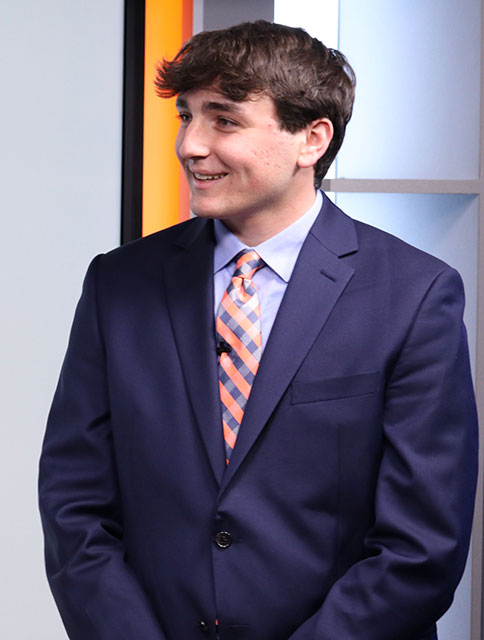
The moment that stands out during my journey at Falk College was the privilege of experiencing different parts of the sports industry across the country. Through research and case competitions, I have had the opportunity to visit multiple cities to network with students and professionals from around the country, experience new cultures, build bonds with fellow students, and have a chance to represent Syracuse and compete against top analysts nationwide.My most impactful trip was attending the Society for American Baseball Research (SABR) Analytics Conference in Phoenix, Arizona, each of the past two years with 20 other Syracuse students to compete in the Diamond Dollars competition and present some of my own research on Major League Baseball umpires and the challenge system.
Working closely with my peers has created a sense of community within Falk College, for which I’ll always be grateful, and has helped me make lifelong friends and many incredible memories. I’m excited to return to Phoenix as an alum and watch future generations of Falk students compete, and I’m also excited to see how they can one-up what we accomplished!
Faculty of the Year Awards

Mary Kiernan, Colleen Cameron, and Fei Pei were honored with 2025 Falk College of Sport and Human Dynamics Faculty of the Year awards for excellence in teaching, service, and research, respectively. The honorees were nominated by their peers for outstanding teaching, scholarship, and internal and professional service contributions and announced by the Falk College Faculty Council in late April.
Here’s a look at the 2025 honorees with comments from their award presenters:
Chef Mary Kiernan, M.B.A.
Undergraduate Director, Food Studies, and Teaching Professor, Nutrition and Food Studies
Evan Weissman Memorial Faculty of the Year Award for Teaching Excellence
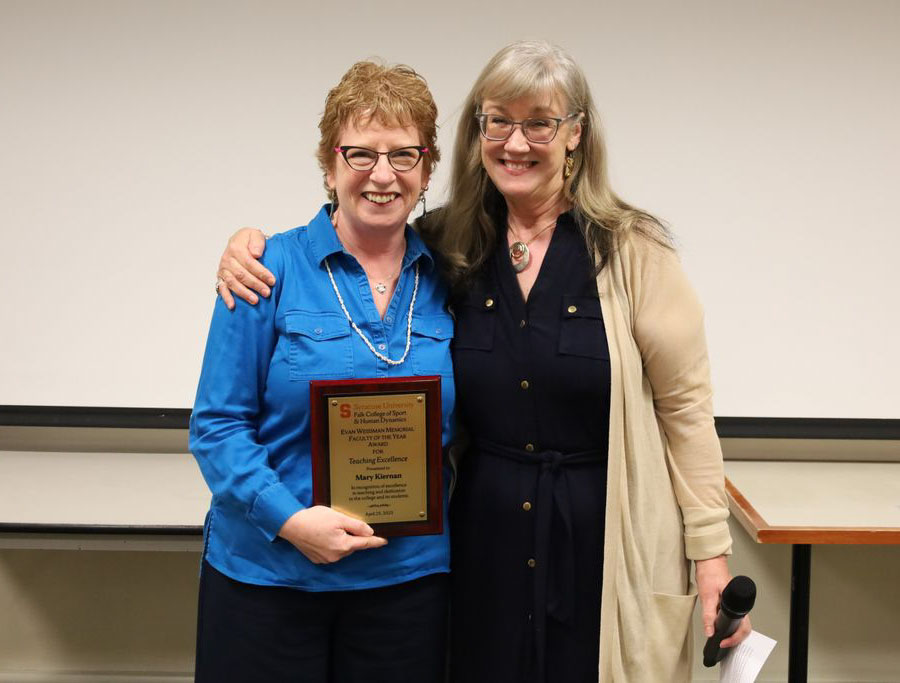
“It’s hard to imagine a more fitting honoree for an award that bears Evan’s name. In so many ways, Mary embodies Evan’s philosophy—his passion for student mentorship, commitment to teaching, dedication to social consciousness, and, of course, his dedication to food studies.
“Mary is a Teaching Professor in the Department of Nutrition and Food Studies, where she is known for transforming her classrooms into dynamic, immersive spaces. Her courses—spanning food safety, systems management, and urban food systems—equip students with essential technical skills while also challenging them to explore the social, cultural, and ethical dimensions of food.
“What truly distinguishes Mary in the teaching kitchen is her ability to bridge theory and practice. Whether she’s redesigning core curricula, mentoring independent projects, or advising students, she brings clarity, creativity, and compassion to everything she does.
“Her leadership as Undergraduate Director for the Food Studies program, her engagement with professional networks, and her commitment to inclusive, culturally rich programming and hands-on culinary experiences enrich our campus and our community. Mary’s work exemplifies excellence in education—and the spirit of this award.”
Learn more about Evan Weissman, Ph.D., Associate Professor in Food Studies and Nutrition who passed away in 2020.
Colleen Cameron, CCLS, M.Ed.
Undergraduate Director and Professor of Practice, Human Development and Family Science
Faculty of the Year Award for Excellence in Service
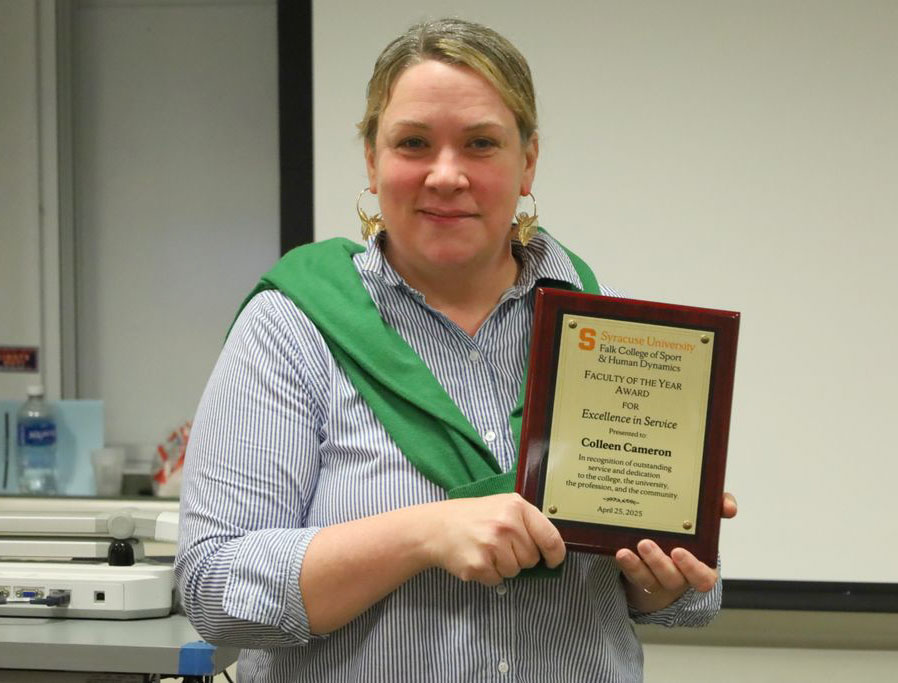
From presenter Tracey Reichert Schimpff, M.A., Ph.D., LMFT, Graduate Director and
Associate Teaching Professor, Department of Marriage and Family Therapy:
“Colleen is a Professor of Practice in the Department of Human Development and Family Science (HDFS), and a certified Child Life Specialist and End of Life Doula. She has been with Syracuse University since 2009, serving students, her Department, and the field.
“Her nomination letter states, ‘Colleen has always exemplified the very best of student-focused work and a commitment to our students and program. She is uniquely and wholly committed to the success of our students and has always gone above and beyond. Overall, Professor Cameron’s service work has been exceptional both in its breadth and in its impact.’
“In the nomination materials, it was noted that Colleen’s signature service is heading the Child Life program. It is an endorsed program that leads graduates to become certified Child Life Specialists. This requires knowledge of requirements, oversight of curriculum, and guiding students through the process that leads to certification. Colleen single-handedly ensures that this program continues.
“This past year, Colleen also served as Undergraduate Director in HDFS, managing curriculum, working with admissions and marketing, and engaging directly with students (and sometimes families). In a year of transition, I imagine this has been quite an undertaking!
“In HDFS, Colleen also serves as faculty advisor and chair of the Student Engagement Committee, which was created to increase student voice and connection. From what I understand, this committee has grown, and students have benefited greatly from Colleen’s dedication. Colleen served as mentor for Renee Crown honors students and led the HDFS New York City Career Immersion Trip, a trip that is highly regarded by HDFS students.
“In addition to the significant roles she plays in HDFS, Colleen also served at college and university levels. In 2024, Colleen was selected to serve on the Human Development Task Force. She was very committed to the process, and worked diligently to gather information and advocate for her department.
“Collen serves on the Syracuse University Senate and its Research and Creative Scholarship Committee. Collen is also engaged in service to her profession, acting as Director of the Conference Committee and Co-Chair of the Clinical Experience Task Force for the Child Life Academic Society. Finally, Colleen has even found time to volunteer at her school district and community council.
“It seems obvious that Colleen has made significant contributions to students, her department, and the larger University. She serves with commitment and leads with passion and professionalism. I am proud to call Colleen my colleague.”
Fei Pei, Ph.D.
Assistant Professor, School of Social Work
Faculty of the Year Award for Excellence in Research
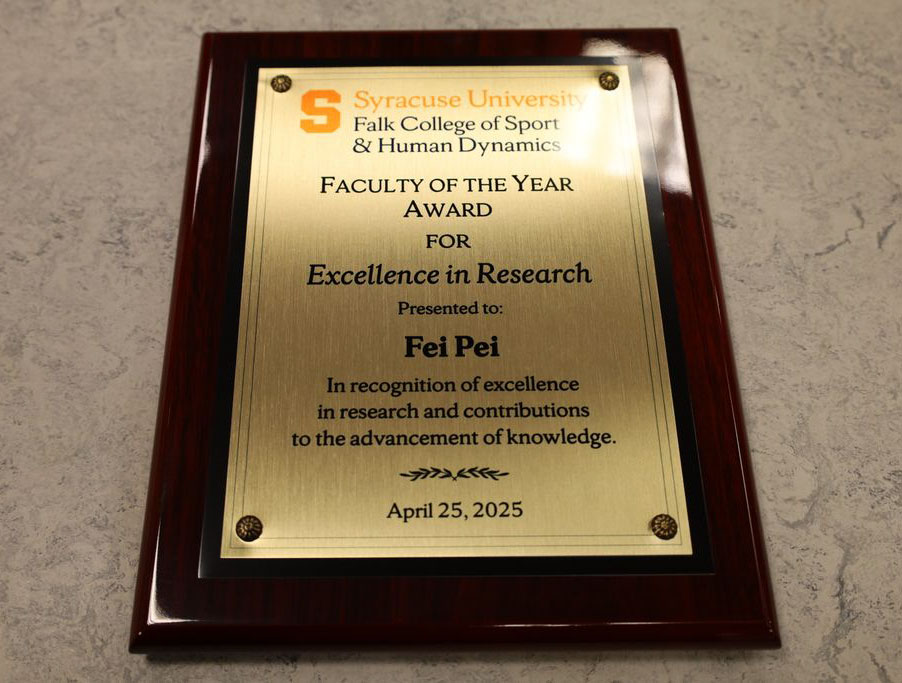
“Dr. Pei, who is in her fourth year in the School of Social Work, is a dedicated and productive researcher. Her advanced quantitative work demonstrates a clear research focus and trajectory and contributes to a crucial discourse in our field on the effects of neighborhood conditions, including violence, on children’s development.
“Fei has published 37 peer-reviewed articles in top-ranking interdisciplinary journals, including “Child Abuse and Neglect,” “Development and Psychopathology,” and “Children and Youth Services Review.” In 2024, she published four articles–three of which are first-authored–and submitted four additional manuscripts that are currently under review.
“In 2024, Fei also submitted four external grant applications, including three NIH (National Institutes of Health) applications for which she is principal investigator. Three of these applications are still under review and could use our collective good vibes!”
Page 1 of 37
